 23/02/2009 20:14 23/02/2009 20:14 |
|
| | | OFFLINE | | Post: 15 | Registrato il: 16/02/2009
| Utente Junior | |
|
Vatican demands closure of tax havens (Encyclical News) MUMBAI: While international pressure is mounting on offshore banks to relax secrecy rules, the Vatican, the seat of the Catholic Church, wants all
offshore tax havens to be closed. The official statement from the Vatican, called an encyclical, is expected to ask for a closure of such tax havens. The encyclical is scheduled to be released on March 18 by Pope Benedict XVI.
The Catholic Church periodically issues the encyclical on various issues it is concerned with. It had planned to come out with an encyclical on tax havens last year, but postponed the date following a decision to do a thorough research on global economics and the reasons that have led to the current slowdown.
The office of the Archbishop of Mumbai said: "We expect the encyclical to be published on March 18. However, a formal release will happen on May 1, on the International Workers’ Day.” A policy paper issued last December by the Vatican, blamed the current financial crisis on offshore centres such as Channel Islands, which are basically British dependencies.
The paper, in a scathing attack on “unhealthy and inequitable financial practices," also pointed to the alarming figure of global deficit caused by offshore banking. The size of global deficit is estimated to be around $255 billion, almost three times the aid given to developing countries globally. Closure of these offshore banks, according to the Pope, should be the first step out of the current global economic crisis.
It is also reliably learnt that the encyclical sees the tax havens as the main conduit for transferring money from poverty-stricken nations to the rich world and the consequent impoverishment of the people in developing and under-developed countries.
The Vatican looks at the huge amounts siphoned off to these offshore banks as the money that the governments in developing countries could have utilised for helping the poor. The Church’s concern on offshore banking also coincides with the global awareness of fiscal dangers caused by tax havens.
Such havens have also featured in issues raised during the recent US presidential campaign. Democratic presidential candidate John Edward had said that deposits worth $1.5 trillion were held by US citizens in various offshore banks.
Current US president Barrack Obama has vowed to check tax evasion by US citizens, estimated to be around $100 billion every year. UK, too, has promised to review ‘offshore centres’ under its jurisdiction. Unofficial estimates suggest that money stashed away in these tax havens could be anywhere between $11-12 trillion.
According to a recent report submitted to the Central Board of Direct Taxes, (CBDT) by a former revenue official, the value of deposits held by Indians in Swiss Banks alone could be over $1 trillion. |
|
 23/02/2009 21:55 23/02/2009 21:55 |
|
| | | OFFLINE | | Post: 16.697 | Registrato il: 28/08/2005
| Utente Gold | |
|
OREMUS PRO PONTEFICE NOSTRO
The Holy Father requests the prayers of all the faithful so that the Lord may illumine the road for the Church. May the commitment of Pastors and the faithful grow, in support of the delicate and weighty mission of the Successor of the Apostle Peter as 'the guardian of unity' in the Church.
- Vatican Note, Feb. 4, 2009
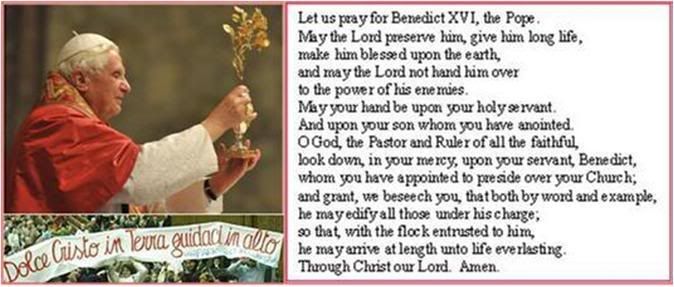
 In reply to a number of messages from new users (as well as a few veteran users but non-members) about the 'difficulty' of navigating within the Forum, I hope this helps:
In reply to a number of messages from new users (as well as a few veteran users but non-members) about the 'difficulty' of navigating within the Forum, I hope this helps:
FOR NEW VISITORS TO THE FORUM: To navigate within the page you are now on, scroll up or down as needed.
To see preceding entries in NEWS ABOUT BENEDICT, Click on 'Previous page', above right.
To get to other topic threads of the English section, click on the 'envelop' above right, tagged 'Fans speaking English' -
it will get you to the board with all the topic threads available in the section.
On that board, to get to the latest page containing the most recent entries on the topic you choose,
click on 'Last' in the parentheses indicating page numbers right after the subject title,
Once you get to that page, proceed as above.
 Please see preceding page for several earlier posts today, 2/23/09.
Please see preceding page for several earlier posts today, 2/23/09.
 What New York's new archbishop means
What New York's new archbishop means
for American Catholicism:
The Pope's forward-looking decision
may be his legacy to the US Church
By Dan Gilgoff

Posted February 23, 2009
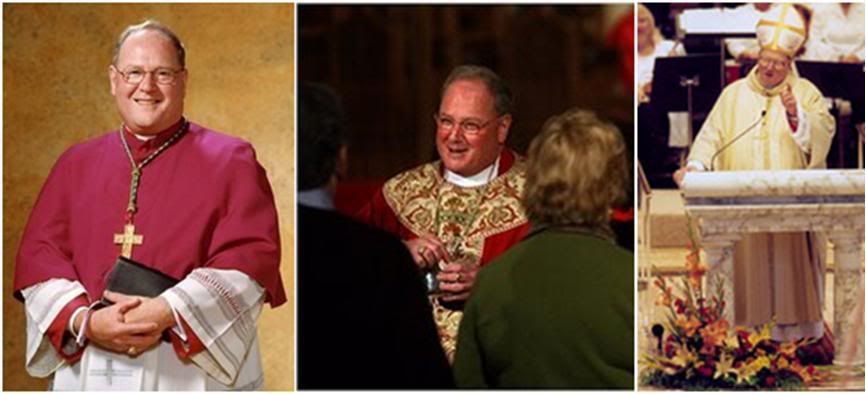
NEW YORK — It's hard to overstate how much anticipation had built up among priests, lay Roman Catholics, and Vatican watchers around the naming of the next archbishop of New York, who Pope Benedict XVI announced today will be Timothy M. Dolan, previously archbishop of Milwaukee.
Priests had been E-mailing one another with the latest gossip about which three names appeared on the job's official shortlist, called the terna.
In choosing new bishops, the top-secret list is drafted by the Vatican's U.S. ambassador, sent to a committee of bishops in Rome —which can edit the list — and then passed along to the Pope, who usually selects bishops from the names on the terna list but who is also free to stray.
"Another morning. More tumbleweeds," the Catholic news and gossip blog Whispers in the Loggia reported last Wednesday, capturing the frustration in Catholic circles over having to wait yet another day for an announcement about New York, which had been expected for weeks. "Stay tuned."
"Same goes for Thursday," the blog deadpanned the following day. "Try to keep calm."
For diocesan priests in New York, that was impossible. [What's the big deal? A few days delay is earth-shattering? Must the Vatican act to their expectations even as to timing an announcement?]
"This is the man who will be responsible for crucial decisions in their lives: what parish they'll be sent to, whether or not they'll be made pastor, how major problems will be confronted in their parish," says James Martin, a New York-based Jesuit priest and associate editor at the Catholic magazine America. "When so much authority rests in one man, there's bound to be this kind of breathless anticipation." [Yes, but given that everyone was so sure it would be Dolan, what was th breathlessness about? Except too find a pretext to yet again 'reproach' the Vatican for something, anything!]]
In the case of New York, however — where outgoing archbishop Cardinal Edward M. Egan recently submitted his resignation letter to the Vatican upon turning 75 years old, as is the custom for bishops — the drama extended far beyond the borders of the archdiocese and its 2.5 million Roman Catholics.
Though there are more Catholics in other archdioceses, like Los Angeles, and though the Church is growing much faster in the South and Southwest, New York's archbishop has long held a unique position in American Catholicism.
"The archbishop of New York is the closest thing we have to an American Pope," says John Allen, senior correspondent for the National Catholic Reporter . "In some ways, he plays the role of leading the American Catholic Church."
In choosing Dolan, Pope Benedict — making his highest-profile U.S. appointment since his 2005 election — signaled that he wanted a warm, media-friendly presence who is theologically and politically conservative but who has taken a less strident approach toward pro-abortion-rights politicians than some U.S. bishops.
"He can firmly state the Catholic position but is also someone who dialogues with public officials," says Catholic Church scholar David Gibson. "The Pope wanted somebody who is not going to put his foot in his mouth and who will put the Church first."
At the same time, Dolan will "put more time and energy into pro-life causes, be instinctually pro-Rome in his thinking and doing business, and will take the liturgical rules more seriously" than other, more liberal finalists for the position, according to Allen.
Dolan's choice carries so much weight for the future of the wider American Church largely because of New York's position as the nation's capital for media and culture.
When Pope John Paul II met then New York Archbishop John O'Connor in 1983, the Pope called him "archbishop of the capital of the world," a reference to Rome, which once held that title.
In an interview, Whispers in the Loggia blogger Rocco Palmo noted that as far back as 1875, the Vatican picked New York's archbishop to be the first American cardinal, snubbing Baltimore, the church's first U.S. diocese.
But the anticipation surrounding the selection of New York's archbishop was heightened by the fact that Cardinal Egan has kept a much lower profile than others who've held the post, forgoing the television appearances that were a hallmark of O'Connor, Egan's immediate predecessor.
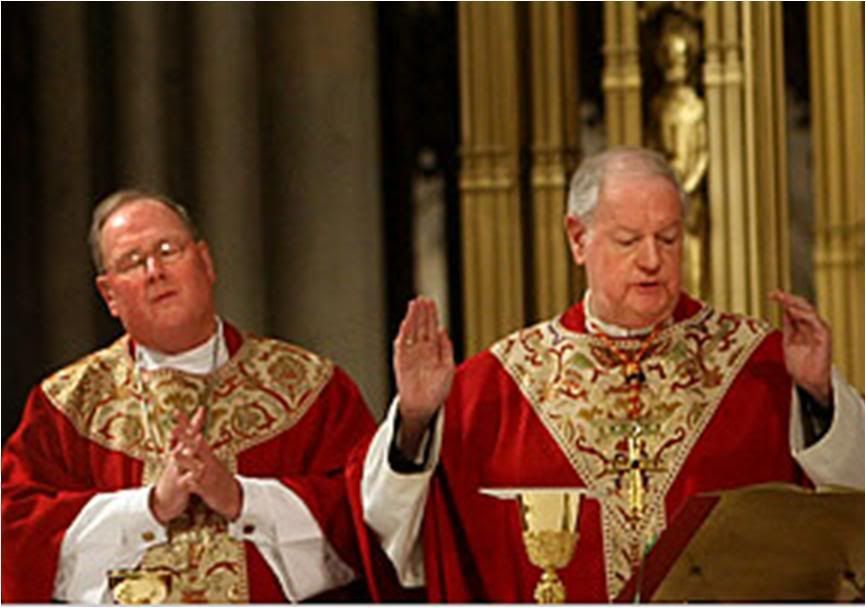 Cardinal Egan (right) adn Archbishop Nolan concelebrated Mass at St. Patrick's Cathedral Monday morning.
Cardinal Egan (right) adn Archbishop Nolan concelebrated Mass at St. Patrick's Cathedral Monday morning.
Egan earned praise for reining in the archdiocese's enormous deficit, mainly through the unpleasant work of closing parishes and schools. But he also earned a reputation as chilly and aloof, even among the priests in his archdiocese.
Named as New York's archbishop in 2000, Egan was in Rome during the September 11 attacks and was slow returning to his devastated flock, setting the tone for the rest of his tenure, according to Allen.
"Egan had such a low profile that he was criticized for it by the left and the right," says Gibson, author of The Rule of Benedict: Pope Benedict XVI and His Battle with the Modern World. "They both want someone who is much more visible."
Dolan, who in Milwaukee succeeded an archbishop who'd secretly given $450,000 to silence a man who claimed to have had a sexual relationship with him, and who took a relatively public and proactive approach in dealing with the church sex abuse scandal, is expected to embrace the national platform that New York offers.
In light of President Barack Obama's recent election, some may also view the selection of the conservative Dolan as the Pope's way of pushing back at American political trends.
But the National Catholic Reporter's Allen says that would be a mistake. "The Vatican is the classic example of an institution that thinks in terms of centuries," he says.
Allen notes that Dolan, age 59, "can be in it for 16 years, well beyond the life span of the Obama administration." And almost certainly beyond the life span of Pope Benedict, who turns 82 this year. Which means Dolan's selection may be this Pope's major legacy for the American Church.
NB: Earlier today, Benefan posted an excellent roundup of bio-backgrounders on Archbishop Dolan in NOTABLES.
[Modificato da TERESA BENEDETTA 23/02/2009 22:51] |
 23/02/2009 23:44 23/02/2009 23:44 |
|
| | | OFFLINE | | Post: 16 | Registrato il: 16/02/2009
| Utente Junior | |
|
The Compliment Which Hurt Pays by Austen Ivereigh
www.americamagazine.org/blog/entry.cfm?blog_id=2&id=53449843-3048-741E-53736287...
Paul Elie's superb Atlantic Monthly essay (http://www.theatlantic.com/doc/print/200903/archbishop-canterbury?x=54&y=2) on the Archbishop of Canterbury includes an anecdote about Dr Williams joking that he should have worn a T-shirt with the words GRAVELY DEFICIENT on it to visit the then head of the Vatican's Congregation for the Doctrine of the Faith (CDF), Cardinal Ratzinger.
Because I gave Paul the anecdote, I hope he won't mind me slightly correcting it. Dr Williams said it not after visiting Cardinal Ratzinger under John Paul II, but after returning from a delegation of religious leaders who greeted Pope Benedict XVI the day after his inauguration Mass in 2005. Same man, different occasion.
Dr Williams and the Anglican delegation were staying at the English College in Rome, the guests of Cardinal Cormac Murphy-O'Connor for whom I was then working. I waved off the posse of Anglican bishops and their advisors that morning and greeted them when they came back five hours later. They had left in a buoyant mood to greet the new Pope, but returned visibly furious.
That's when Dr Williams joked -- it was a sardonic joke, said through gritted teeth -- that he thought he should have worn a T-shirt bearing the words "GRAVELY DEFICIENT". The words had been used in Card. Ratzinger's bombshell 2000 document Dominus Iesus to describe non-Christian faiths. The Churches of the Reformation had been described in a note attached to the document as "ecclesial communities", because, unlike the Orthodox -- described as "true particular churches" -- they were not "churches in the proper sense".
In 2005, the delegation of Christian leaders to greet the new Pope had been split into two categories: the "Orthodox Churches" on the one hand, and the "ecclesial communities of the west" on the other, with whom the Anglicans had been lumped. This was consistent with Dominus Iesus, and for the Anglicans a serious snub: it meant that Rome's official view of Anglicanism was that it did not have valid bishops or Eucharist. Over lunch I spoke to various members of the delegation, and each said the same: that it had been disappointing, insulting and hurtful to them not to be lumped in with Protestant churches which lack sacraments and clergy.
That moment brought home to me just how much pain has been felt by Anglicans over the years at Rome's dismissal of their claims to be Catholic. In Apostolicae Curae (1896) Pope Leo XIII had described Anglican orders as "absolutely null and utterly void"; over 100 years later, Pope Benedict appeared to repeating the same snub, made all the more hurtful now because of the strides towards unity made in the previous decades by Rome and Canterbury through the ARCIC process.
In his article Elie puts forward the suggestive idea that it was "theology like this" - Dominus Iesus, and presumably that of the CDF's earlier characterisation of homosexual tendencies as "intrinsically disordered" -- "that led many Anglicans and Episcopalians to conclude that the ordination of openly gay people as bishops was not only permissible, but full of grace".
If this is true, it reinforces the impression I garnered from the Anglican delegation's reaction in 2005: that Anglicans care very deeply about what Rome thinks, and can be led to adopt certain positions precisely because they are not Rome's -- if what they hear from Rome is language of violence and rejection. The more extreme liberal positions adopted by the US Episcopalians, in this view, are not ignoring Rome so much as reacting against it.
This deference is not just confined to more Catholic-minded Anglicans. Nicky Gumbel, founder of the hugely successful Alpha Course , and firmly in the evangelical wing of Anglicanism, once told me of a visit he had made to Cardinal Ratzinger at the CDF. He said he was "incredibly nervous" beforehand, and his heart missed a few beats when the German inquisitor told him they had "a file this big" on the Alpha Course.
Cardinal Ratzinger then beamed: "And it is ALL positive!"
His thumbs-up made Gumbel as happy as the reception of the Anglican delegation by the same man as Pope had made Dr Williams furious.
What Rome says matters -- and sometimes it matters more to those not in communion with it than those who are.
*********************************************************************
I think it must be explained that Austin Ivereigh was until recently, press ssecretary to Cardinal Murphy O'Connor, who was one of the few cardinals who all but publicly denounced his fellow cardinals for having elected Joseph Ratzinger right after the April 2005 conclave. That therefore, Ivereigh's views are necessarily colored by his former boss's rather liberal, openly Vatican-defying positions. (At least I can't imagine anyone being press secretary to a VIP if he did not share his views.)
Besides, his very association (contributing editor? or something similar) with the ultra-liberal Jesuit magazine America speaks for itself.
For these reasons, whatever he says about Joseph Ratzinger/Benedict XVI is necessarily suspect if not openly malicious.
But I find his statement questionable, at the very least, that "Anglicans can be led to adopt certain positions precisely because they are not Rome's -- if what they hear from Rome is language of violence and rejection". (What language of violence has Rome used? Unless stating certain truths, from the point of view of the eternal Church, is considered 'violence' by Ivereigh!)
If I were Anglican, I would be insulted, because he makes it appear that Anglicans - including the Archbishop of Canterbury - would make doctrinal or pastoral decisions simply out of spite and dudgeon. What kind of faith is it that would act for petty reasons instead of sticking up for what it's supposed to stand for?
At the same time, that cavalier ex-cathedra statement by Ivereigh - in which I do not detect any irony at all - also gives the ultra-liberal Anglicans an excuse for their accommodation of gay bishops, women bishops, gay marriages and other favorite liberal causes - which are driving out more traditional Christians such as the appropriately named Traditional Anglican Communion and many Episcopalian communities in the United States from the Anglican Church.
Adn I hope Rowan Williams has made known his feelings to the Pope and to Cardinal Kasper in all the meetings he has held with them the past four years, because it does not say very much of him to make the 'jokes' he made outside their company while going through the motions of 'dialog'. Dominus Iesus stands as a statement of the Catholic Church position. If the Anglicans were truly that offended about it, they would have stopped all pretense of dialog after 2000 - only they can't afford to be seen as anti-ecumenical.
Well, Williams has enough problems to keep his Anglican Communion together to make jokes about the Catholic Church.
TERESA
P.S. Another point I would make against Ivereigh is his apparent admiration for Paul Elie who wrote that horribly biased Atlantic Monthly 'novelette' [a true piece of fiction] in 2006 accusing Joseph Ratzinger, among other things, of having actively plotted to become Pope.
[Modificato da TERESA BENEDETTA 24/02/2009 19:34] |
 24/02/2009 12:08 24/02/2009 12:08 |
|
| | | OFFLINE | | Post: 16.701 | Registrato il: 28/08/2005
| Utente Gold | |
|
 Fathers Bux and Vitielli write a weekly theological column, 'Parole della dottrina' [Words of the doctrine), for Fides, the news agency of the Congregation for the Evangelization of Peoples.
Fathers Bux and Vitielli write a weekly theological column, 'Parole della dottrina' [Words of the doctrine), for Fides, the news agency of the Congregation for the Evangelization of Peoples.
A reader of Lella's blog has called attention to their weekly column dated January 22, 2009, which means it was published before the decree that lifted the excommunication of the four FSSSPX bishops. But it was nonetheless 'prophetic'. It also ties in to the Holy Father's recent statements about the nature of the office of the Succesor of Peter.
Bux and Vitielli wrote about the questions raised by the decree in their succeeding column, which was translated and posted on this thread in a timely manner.
Local bishops' opposition
to the Pope's Magisterium
injures the unity of the Church
Translated from

January 22, 2009
In many pastoral letters the Pope is no longer cited as the model for authenticity in episcopal teaching as well as its guarantee of Catholicity. Some bishops will rather cite some cardinal or theologian, even a layman who is not necessarily a believer, or the priest du jour, all presented as authorized interpreters of the Church's official teaching.
Moreover, the impression is given that a declaration by such persons, even if deviating from Catholic truth, has the same weight as a pontifical pronouncement.
The same thing goes in the field of ecumenical and inter-religious dialog, in which the opinion of a rabbi or an imam is presented as being the consensus of the entire Jewish world or the entire Islamic world - neither of which has a 'hierarchy', and in which a rabbi or an imam are not the equivalent of 'bishops' even if they may be experts and 'doctors' by personal merit.
What is happening? Such bishops and priests forget that Lumen gentium - the Vatican II constitution on the ecclesiology of the Catholic Church - reaffirms the Church as the People of God who are ordered hierarchically/ And what they practise is a dismissal of and opposition to the Magisterium of the Church, as constituted by the indispensable and necessary link between the Bishop of any local Church and the Supreme Pastor of the Universal Church.
It is almost as though some bishops think there exists a local Magisterium that does not have to be in close dependency and theological relationship (and thus, juridical) with what the Supreme Pastor teaches.
All this began in 1968 with the opposition to Paul Vi's encyclical Humanae vitae.
Although it is through the mass media that fragments of the Pope's words - generally without heads or tails - are all that ever get to the 'end user', namely the faithful in his home, each individual Catholic nonetheless has the right and the expectation to receive the papal teaching in its entirety from the pastors of their local Church - their bishops, priests and lay collaborators.
From the Apostles onwards, what has made the Church 'function' as a Church has been the assiduity of teaching the common essential
doctrine, one of the conditions for becoming one heart and one spirit.
It is traditio, the literal transmission of the faith, that happens maximally in catecheses and in liturgy, especially in the homilies. Obviously, without such tradition-transmission of faith, there can be no reception on the part of the faithful.
The paradox we have arrived at is that too much is made about the reception of ecumenical teachings, while muffling, or worse, deliberate censorship by omission, of papal teachings is exercised at the local level.
It always helps to remember that the magisterium of any local bishop is authentic only if it is in effective (and affective) communion with that of the Pope.
Five years after the end of Vatican II, Paul VI, on December 8, 1970, warned against "a tendency to reconstruct, purportedly on the basis of psychological and sociological data, a Christianity that is separate from the uninterrupted tradition that links to the faith of the Apostles, and to exalt a Christian life devoid of religious elements".
Such a phenomenon could only cause divisions and oppositions within the Church. Have Catholics become infected by the Greek Orthodox concept of autocephalous [self-headed) Churches and/or by Protestant "free choice of the will' [what cafeteria Catholics mean when they say 'primacy of conscience]? Did Vatican II imply or mean in any way that there exists a triarchy among Rome, Constantinople and Moscow?
No. None of that has anything to do with the Catholic principles reaffirmed by Vatican II.
That the Church should be attacked by the outside world is something 'physiological', but that it should be attacked from within cannot be of little concern. Because such internal dissent, at least from the purely human point of view, conditions the effectiveness of evangelization.
Not infrequently, when the faithful listen to a priest or a bishop preach something different form what the Pope says, they realize the confusion that is generated and demand a uniformity in teaching.
There is now an opposition and sometimes a contempt for the Church as it is, in the name of a 'future' Church, that propagates an interpretation of the Church that always harks back to the preceding Pope.
And so today, there are those who exalt John Paul II whereas when he was alive they attacked him for being conservative and reactionary [while exalting Paul VI whom they scorned and defamed mercilessly for Humanae vitae].
Disobedience is a sin that requires confession, if only because its exercise by bishops and priests towards the Pope ends up, at the very least, ultimately fostering indifference to the Magisterium on the part of the faithful, in whom they sow confusion and disorientation.
Only the living Magisterium of the Pope and the bishops in communion with him - underscoring 'in communion with him' - constitutes a firm and sure orientation for the boat of the Church even in our time, in order to help form good judgment on faith and morals, and to choose the good over the bad in the light of Christ's truth.
Christ entrusted 'his sheep' - which means all of us - to Peter. That is a hermeneutic of Catholicity and has always been.
 Do we really think that everything the Pope has said - at least about what Vatican II actually, textually says - about the function of the Bishop of Rome and the other bishops of the Church, will make the dissident bishops and priests go back and review the Vatican II texts at all?
Do we really think that everything the Pope has said - at least about what Vatican II actually, textually says - about the function of the Bishop of Rome and the other bishops of the Church, will make the dissident bishops and priests go back and review the Vatican II texts at all?
We can pray that they do so, but unless they allow the Holy Spirit to act on them, they won't. They've become so heavily invested in the past four decades at simply parroting what progressivist theologians have held out as the 'spirit of Vatican II' that they apparently have never bothered to look at the letter (i.e., the texts) of the Council.
That has been most obvious about Sacrosanctum concilium, on the liturgy, which they never quote (because to quote any of it would undermine their willful perversion of its letter and intent), as well as Lumen gentium and Gaudium et spes, of which they selectively quote only the ambiguous passages that they can manipulate to 'support' their twisted hermeneutic of discontinuity.
[Modificato da TERESA BENEDETTA 24/02/2009 14:29] |
 24/02/2009 12:41 24/02/2009 12:41 |
|
| | | OFFLINE | | Post: 16.702 | Registrato il: 28/08/2005
| Utente Gold | |
|

February 24
 Shrove Tuesday
Shrove Tuesday
Blessed Luke Belludi (1200-1286)
Friar and Companion/Successor
of St. Anthony of Padua
OR for 2/23-2/24/09:
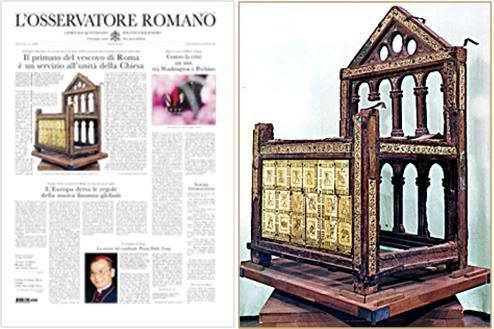
At the Sunday Angelus, Benedict XVI reminds the faithful
that the Chair of Peter presides in charity over the universal Church:
'The primacy of the Bishop of Rome is a service to the unity of the Church'
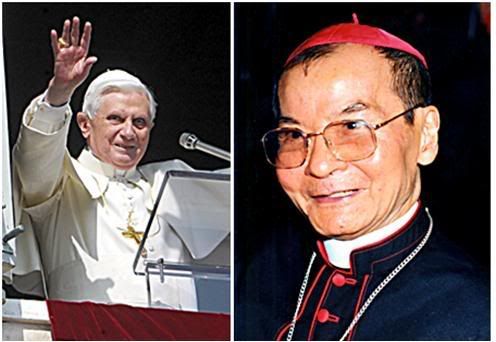 Other Page 1 stories: The Pope mourns the death of Vietnamese Cardinal Pham Dinh
Other Page 1 stories: The Pope mourns the death of Vietnamese Cardinal Pham Dinh
Tung; Hillary Cinton proposes a Washington-Beijing axis against the worldwide financial
crisis; the Berlin summit of the European Union in April aims to 'dictate' the new
rules of global finance. Among the inside-page storis are two on the Hollywood Oscars,
particularly one on the Best Film "Slum Dog Millionaire' set in Mumbai and a backdrop
of inter-religious/inercultural confrontation.
No scheduled events for the Pope today.
The Vatican announced two 'promotions' made by the Pope:
- Cardinal Jose Saraiva Martins, emeritus Prefect of the Congregation for the Causes of Saints,
to the Order of Bishops in the College of Cardinals, assigning to him the suburbicarian Church of Palestrina.
- Cardinal Agostino Vallini, his Vicar General for the Diocese of
Rome, to the Order of Priests in the College of Cardinals, while retaining the Diaconate of San Pier Damiani
on Mondi di San Paolo in Rome, elevated for this purpose to prebyteral status. [The cardinals are classified -
in order of their appointment as cardinals - as deacons, priests and bishops, respectively.]
[Modificato da TERESA BENEDETTA 24/02/2009 14:09] |
 24/02/2009 14:06 24/02/2009 14:06 |
|
| | | OFFLINE | | Post: 16.704 | Registrato il: 28/08/2005
| Utente Gold | |
|
 Pope's wish for the Middle East:
Pope's wish for the Middle East:
To become a land of dialog
and fraternal collaboration
Translated from
the 2/23/-2/24/09 issue of

Benedict XVI hopes that the Middle East "may become a land of dialog and fraternal collaboration, or reciprocal respect and peace, thanks to the responsible contribution of all the believers who live there".
This was expressed by Cardinal Tarcisio Bertone, Secretary of State, in a letter sent to participants of a study seminar on the theme "The value of the churches in the Middle East", a Christian-Muslim discussion promoted by the Community of Sant'Egidio and which took place in R0ome yesterday, Feb. 23.
The theme is of clear social and religious relevance, wrote Bertone, as a "further step in the patient and profitable itinerary of dialog among Christians and Muslims on matters of reciprocal interest".
In fact, he says, it confronts "the crucial problem of the presence of Christian communities in lands which are prevalently Muslim".
The objective, therefore, he adds is "to highlight, with the help of authoritative representatives from the Islamic world who are present, how the presence of Christians int he Middle East represents a true richness for all of society and a significant guarantee of social, cultural and religious development".
Cardinal Bertone extended to the participants and organizers the Pope's expressions of esteem and friendship, saying he "invokes divine blessing on this important meeting and sincerely hopes that it will come up with elements useful to make the Christian-Muslim dialog ever more fraternal, especially where Christian communities are very much in the minority".
Cardinal Bertone recalled the address given by Benedict XVI to Islamic representatives in Cologne in August 2005 and his meeting last November with the participants of the first seminar of the Catholic-Muslim Forum held under the auspices of the Pontifical Council for Inter-Religious Dialog.
Yesterday;s seminar had three parts - 'Spiritual richness', 'Culture, solidarity and education', and "A window on the world'. It ended with a roundtable discussion by media representatives from the Middle East on "Christians in the Arab world: Communicating the complexities".
Among the speakers were Church historian Andrea Riccardi, founder of the Sant'Egidio Community; Archbishop Antonio Maria Vegliò, secretary of the Congregation for Oriental Churches; Archbishop Jean Benjamin Sleiman of Baghdad of the Latins; Archbishop Paul Youssef Matar of Beirut of the Maronites; Archbishop Louis Sako of Kirkuk of the Chaldeans; Greek Orthodox Metropolitan Paul Yazigi of Aleppo; and Mar Gregorios Yohanna Ibrahim, Syrian Orthodox Metropolitan of Aleppo.
The Muslim participants were led by Tarek Mitri, information minister of Lebanon; and Mohammad Sammak, political counselor to the Grand Mufti of Lebanon; along with many Muslim scholars and historians.
[Modificato da TERESA BENEDETTA 24/02/2009 15:48] |
 24/02/2009 17:17 24/02/2009 17:17 |
|
| | | OFFLINE | | Post: 16.707 | Registrato il: 28/08/2005
| Utente Gold | |
|
 The Pope needs our prayers:
The Pope needs our prayers:
Peter's Successor always does
Editorial
by MARINA CORRADI
Translated from

February 24, 2009
From his window overlooking St. Peter's Square, Benedict XVI on Sunday called on the faithful to pray for him "so that I may faithfully fulfill the high mission that Divine Providence has entrusted to me as Successor to the Apostle Peter".
Pray for me, he asked, in an appeal that went around the world, even as media editors used it to continue their speculation about a Pope in fear.
After weeks of harsh controversy, mostly from abroad, characterized by misinterpretations and fierce opposition - in some cases, rather vile - which have made headlines, was this yet another sign, they asked, that the Pope is tired, that he is tottering under the weight of Peter's mission?
And even if this were not just wishful thinking on their part, would that be such a scandal?
Consider what a Pope carries on his shoulders:
He must lead a Church with more than a billion faithful inhabiting all the continents and latitudes, a world on which the sun never sets. [And, I would add, whose internal dissensions have caused chaos in the past four decades unlike any in its modern history.]
There is the urgency, that this Pope has taken on personally, of announcing clearly and tirelessly that Christian hope is not a matter from the remote past but is reliable - here, today and always.
There are the open anti-Christian persecutions in non-Christian parts of the world, and in the West, a pervasive nihilism which gnaws away at the Church and society, seeking to cancel out or at least to confuse the Christian heritage.
Why then should he not ask the faithful, "Pray for me", to those friendly faces, pilgrims who have come from all parts of the world to see him on a Sunday?
Perhaps he wants to look each one directly in the eye, someone anonymous but not alien, down below but close to him, "Pray for me".
And the world may find it strange: When have the powerful, the celebrities, the 'masters of thought' from their cardboard thrones, ever asked anyone to pray for them?
They don't, because 'it is just not done' by people as important as they are. And if they do ask their public for something, it would be something more 'useful' than prayer, which the secular world considers nothing more than pious words said in vain, futile and desperate exercises by those who are weak.
And that is why Peter's humble request moves us, above all, as a sign of a radical difference in outlook. And in heart.
At a time when the individual asserts himself as his own absolute master - sometimes, not only of his own life, but even of others -
the Pope reminds us that a Christian is, first of all, a creature of God, therefore a child of God, ontologically linked to every other human being.
To pray is an acknowledgment that we can't do everything by ourselves, that we depend on the Other, on others - as tendrils must depend on the vine.
But the Pope's Sunday plea was also an echo of words he had said earlier to the seminarians of Rome - when Benedict XVI cited St. Paul's Letter to the Galatians, saying that today as in Paul's time, faith could degenerate into intellectualism, and humility into the arrogance of those who believe themselves superior to everyone else.
It is a temptation as old as man, but much more evident today when every word can be amplified and infinitely repeated in an endless succession of echo chambers.
The pride in saying something which, when reported in the media, acquires its own weight and authoritativeness can, in fact, involve even high-ranking prelates in the Church itself in the game of relativism and personal 'truths'.
But Benedict XVI also reminded all such dissidents that the primacy of Peter's Chair is integral, that it continues, as before and as it was meant to be, to preside in charity over the universal Church. And that the yoke is ultimately on the shoulders of a single man.
The Church is not a democracy - because it is not a human institution. It is the mystical Body of Christ that embodies all of his heritage.
And guiding the Church is one man, the Pope. It is not difficult to imagine him by himself, in prayer and at work, even when down below and around him, everyone has gone.
A Pope who must remind his flock all the time: 'We are one heart and one spirit'. Who asks us, "Pray for me". And the world, which speaks a different language, finds itself amazed.
But in convents around the world and the most remote missions of the Church, in monasteries and the most far-flung parishes, many hear that appeal.
And Christians pray for the Pope and for the Church. They pray tenaciously, faithfully, silently.
'Praying for the Pope -
an act of love for Christ'
by LORENZO ROSOLI
Translated from

February 24, 2009
"Praying for the Pope helps us to purify our awareness of the Church in order to enter into the mystery of sacrament - which is a sign of our 'intimate union with God and the unity of all mankind', as we read
in Lumen gentium, the dogmatic Constitution of Vatican II. It reminds us that it is Christ through his Vicar on earth who leads the Church, not us with our poor human means".
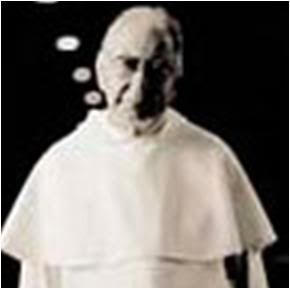
This was the comment of Swiss-born Cardinal Georges Cottier, 86, emeritus theologian of the Pontifical Household, on the words of Benedict XVI at last Sunday's Angelus, on the occasion of the Feast of Peter's Chair.
The Pope had asked the faithful to support him with prayer, after reaffirming the role and primacy of the Bishop of Rome - in service to the unity and diversity of the Church which requires the Successor of Peter to "preside in charity" over the universal Church.
"The Canon of the Mass always contains a prayer for the Pope as the guardian of unity in the faith and of the communion among all Christians" Cardinal Cottier pointed out. "To govern the Church is something superhuman. It is impossible for mere man, without the charism adn grace of the Spirit. That is why at Mass we pray for the Pope and for our respective bishops."
Such prayer, he said, "is an act of love - for Christ and for his Church. And for the Successor of Peter."
Such an act of love, he continued, 'dwells' in the Eucharistic celebration, "but it must also find a place in our personal and communal prayers"
"To pray for the Pope, in fact, reminds us that the life and unity of the Church depends on the providence of God, and by trusting in the the love and omnipotence of God, we acknowledge that it is Christ who leads the Church, not us. Not our humble means, our instruments alone, but through the life that comes from the illumination of the Spirit, a gift we invoke from God through prayer," said the Dominican theologian.
"Too often, it is the acts and the 'style' of governance of the Church hierarchy that occupy the attention of the mass media, of public opinion, and by extension, the faithful," he noted. "But if we obsess on their human failings, we miss the mystery of the Church which we call one, holy, catholic and apostolic. Yet it is at this sacramental level, not sociological, that we see the more profound reality of the Church".
"Of course," he conceded, "there have been faults and mistakes, by the hierarchy as well as other members of the Church. That is why we need to pray: so that each of us may be converted and illuminated to do good. We see this in exemplary manner in the lives of the saints, who keep praying to seek support and illumination from the Holy Spirit for everyone to be in communion within the Church."
"Praying for the Pope is a particularly strong expression of this communion. And it opens our eyes to what the Church truly is."
"In praying for the Pope, we also ask for charity as a gift of God. Just as the Scriptures are nothing but dead letters if we don't live them actually," Cottier concluded, "so does the life of the Church require concrete, historical instruments, but in the end, what counts is that we pray in order to invoke the vitalizing action of the Holy Spirit".
[Modificato da TERESA BENEDETTA 24/02/2009 19:18] |
 24/02/2009 18:10 24/02/2009 18:10 |
|
| | | OFFLINE | | Post: 16.708 | Registrato il: 28/08/2005
| Utente Gold | |
|
 Pope thanks Spain's bishops
Pope thanks Spain's bishops
for their prayers and support

VATICAN CITY, FEB. 23, 2009 (Zenit.org).- Benedict XVI is thanking the Spanish bishops for their spiritual closeness after the turmoil that surrounded the lifting of excommunication of the four bishops ordained by Marcel Lefebvre.
In a letter sent by Cardinal Tarcisio Bertone, the Pope's secretary of state, to Cardinal Antonio María Rouco, chairman of the Spanish bishops' conference, the Holy Father expressed his great appreciation for "the prayers offered for his person and his ministry as 'custodian of unity'."
The Pontiff invoked "abundant divine graces on Your Eminence and on all the Spanish bishops to encourage and sustain you in your pastoral service to the people of God."
A press release from the bishops' conference reported Thursday that this letter was the Holy Father's response to a message of support sent to him earlier by the Spanish prelates.
The lifting of the excommunication in late January caused turmoil mostly because of a situation surrounding Bishop Richard Williamson, one of the prelates concerned. In an interview, the prelate denied the gassing of the Jews.
Coincidentally, the interview aired at about the same time as the bishop had his 20-year excommunication lifted, in the framework of the Pontiff's continuing efforts to heal the schism with the society.
A Vatican spokesman later said the tension that arose around the Jan. 24 decree was due to the "dramatic coincidence" with the publication of the bishop's comments. The Pope was unaware of Bishop Williamson's views on the Holocaust at the time the decree was publicized.
Meanwhile, Lella's blog
 has just made available the text in Spanish of a model pastoral letter from the Bishop of Huesca in Spain, enjoing his diocese to support the Pope in his mission. I will post it as soon as translated.
Looking for Bishop Williamson
From Argentina, conflicting reports in brief items from
has just made available the text in Spanish of a model pastoral letter from the Bishop of Huesca in Spain, enjoing his diocese to support the Pope in his mission. I will post it as soon as translated.
Looking for Bishop Williamson
From Argentina, conflicting reports in brief items from

The FSSPX in Latin America says the controversial bishop left Argentina on the weekend, after the government gave him a 10-day notice to leave the country or face expulsion by decree.
But Argentine immigration officials said they had no official knowledge of Williamson's departure.
Of course, he may easily have left Argentina by car without passing any border stations. Argentina has looooong borders with Chile on the west and south, with Paraguay and Bolivia on the north, and with Brazil and Uruguay on the northeast. I have been driven a couple of times to and from Chile from the border town of San Martin de Los Andes in Patagonia, in places where hthe livery driver knows there are no border stations to worry about.
OOOOOPS....UPDATE!
WILLIAMSON LEFT BA TODAY

fEB 24, 2009
I was tracking down a new interview given by Hans Kueng [pronounced K-EEEEEEWWWWWWWng] to Le Monde - and I did find it, with this photo/bulletin alert about Mons. Williamson:
The brief item says Williamson was pictured leaving Buenos Aires today on a British Airways flight.
It adds that the World Jewish Congress issued a statement saying ot welcomed the Argentine government's move to expel Williamson, saying Argentina has thereby "clearly shown that those who cast doubt on the Holocaust are not welcome in the country".
Do the Jews know what they are saying? Of a country that welcomed thousands of Nazis who left Europe after the war - among them Adolf Eichmann - to find asylum from prosecution for their Nazi past? My goodness, the hypocrisy all around is stunning!
About KEEEEWWWWWNG, he says much of the same outrageous things he said on Italian TV on February 6 in virtually identical words, with quite a few new outrages, such as it is time to call a Vatican III council to take care of 'business left undone' by Vatican II, such as married priests and women priests and post Vat-II, a repeal of Humanae Vitae. Perhaps it's time to translate his nonsense for the record...
[Modificato da TERESA BENEDETTA 25/02/2009 00:52] |
 24/02/2009 20:09 24/02/2009 20:09 |
|
| | | OFFLINE | | Post: 16.709 | Registrato il: 28/08/2005
| Utente Gold | |
|
 Less than a week after all the major UK newspapers, including the Times, openly - and inexplicab ly - mocked Prime Minister Gordon Brown for having been allegedly 'snubbed by the Vatican' after he said he had invited the Pope to visit the United Kingdom, here is a story now with quite a lot of detail to show they may have mocked him too early.
Pope Benedict could visit Britain next year -
Less than a week after all the major UK newspapers, including the Times, openly - and inexplicab ly - mocked Prime Minister Gordon Brown for having been allegedly 'snubbed by the Vatican' after he said he had invited the Pope to visit the United Kingdom, here is a story now with quite a lot of detail to show they may have mocked him too early.
Pope Benedict could visit Britain next year -
and may address Parliament
by Ruth Gledhill
Religion Correspondent

Feb. 23, 2009
The logistics of a visit to Britain by Pope Benedict XVI are being discussed after Prime Minister Gordon Brown, who advises the Queen on state visits, raised the possibility at a meeting with the Pontiff at the Vatican.
The Prime Minister, son of a Church of Scotland minister, told Pope Benedict XVI he would be welcomed by millions as was his predecessor Pope John Paul II in 1982.
But that visit was a pastoral visit in which the Pope, because of sensitivities around the Falklands War, met the Queen but did not visit Downing Street or meet the Prime Minister.
If the Holy See intimates that a visit is on, The Times has learned that it will be upgraded to a State visit and a formal invitation issued by the Foreign and Commonwealth Office and signed by the Queen.
This would be the first ever such visit by a Pope to Britain. It would be timed to coincide with the expected beatificaton of Cardinal John Henry Newman but would also include the extraordinarily dramatic spectacle of the Pope addressing both Houses of Parliament at Westminster, in the same Westminster Hall where St Thomas More was tried and condemned in 1535 for opposing the Act of Supremacy.
This was the act that made King Henry VIII "supreme head" of the emerging new Protestant body, the Church of England, signalling the formal breach with Rome that has yet to be healed.
The Archbishop of Westminster, Cardinal Cormac Murphy-O'Connor, has been the instigator of the proposals, which were first raised with the Pope three years. Diary pressures and sensitivities around Northern Ireland meant no visit was possible then.
If the Pope were to come to Britain on a formal state visit, Ireland would almost certainly be included.
A spokesman for Cardinal Murphy-O'Connor said he understood the Prime Minister's invitation was being "actively considered" in Rome. Next year was more "probable" than this year because of schedules. He said the Cardinal first raised the possibility of a visit more than two years ago it was not possible for a number of reasons, but the invitation had remained open.
"If it can be arranged, it will be great news for Catholics and everyone in England and Wales," he said.
The disclosures come as the Pope today chose the conservative, pastorally skilled Archbishop Timothy Dolan to lead the Roman Catholic diocese of New York. Presently Archbishop of Milwaukee, Dolan, aged 59, will be the latest in a long tradition of New York prelates of Irish background.
Archbishop Dolan’s long-awaited appointment as successor to Edward Egan leaves the path clear for the Congregation for Bishops in Rome to decide who will succeed Cardinal Cormac Murphy-O’Connor as Archbishop of Westminster in London.
Although Birmingham’s Archbishop Vincent Nichols remains the favourite, another name being talked of with increasing seriousness in Rome is Bishop Bernard Longley, from the conservative wing of the Church, who is an auxiliary in the Westminster diocese covering east London.
Of Archbishop Dolan’s appointment, the veteran Vatican correspondent John Allen writes that it is “a choice for the center-right with a human face.”
Dubbing it part of the “Benedict Evolution”, he says it represents a pattern in appointments made by the present Pope of “leaders who are basically conservative in both their politics and their theology, but also upbeat, pastoral figures given to dialogue.”
This would fit the CV’s of Westminster favourites Archbishop Nichols and Archbishop Peter Smith of Cardiff but also of Bishop Longley.
A factor in the decision will be the need for a bishop equipped to lead an archdiocese that would play a central role in any state visit by a Pope to Britain if it goes ahead as hoped next year.
Any visit however would certainly depend on Newman's cause proceeding to the next stage.
Theologians in Rome will meet soon to discuss whether the 19th century’s Church of England’s most famous convert to Rome should be permitted to take the next step towards canonisation and sainthood.
If as expected the beatification goes ahead, the ceremony is expected to take place in Rome. The Pope has made a lifelong study of the writings of Newman. The work of Newman would form the centre of his Westminster Hall address.
[Modificato da TERESA BENEDETTA 24/02/2009 20:10] |
 25/02/2009 16:45 25/02/2009 16:45 |
|
| | | OFFLINE | | Post: 16.715 | Registrato il: 28/08/2005
| Utente Gold | |
|


February 25
Ash Wednesday
Blessed Sebastian of Aparicio
OR today.
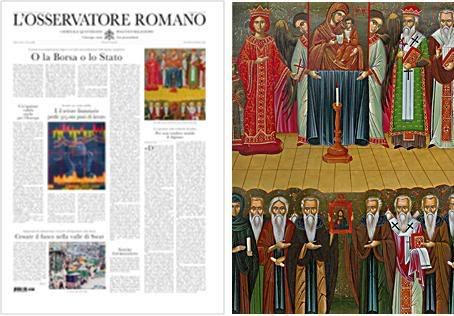
No papal stories in today's issue. The long lead article is a reflection on Lent in
the Byzantine tradition, particularly fasting. Main news stories on Page 1 are on various
aspects of the worldwide crisis in the US and Europe; and a ceasefire by the Taliban in
Afghanistan's Swat valley.
THE POPE'S DAY
No General Audience today.
The Holy Father met with
- Bishops of Nigeria (Group 6) on ad-limina visit.
 Ash Wednesday
Ash Wednesday
16:30 Basilica of St Anselm
Statio and Penitential Procession
17:00, Basilica of St Sabina, at 17.00
Holy Mass, Blessing and Imposition of the Ashes
The Vatican released the text of the Holy Father's letter to Mons. Geraldo Rocha, president of the Brazilian
bishops' conference and Archbishop of Mariana, on the occasion of the annual 'Campaign for Brotherhood'
of the Church in Brazil, which starts today, Ash Wednesday. This year's theme is "Brotherhood and public
security". Original text in Portuguese.
[Modificato da TERESA BENEDETTA 25/02/2009 23:27] |
 25/02/2009 18:57 25/02/2009 18:57 |
|
| | | OFFLINE | | Post: 16.717 | Registrato il: 28/08/2005
| Utente Gold | |
|

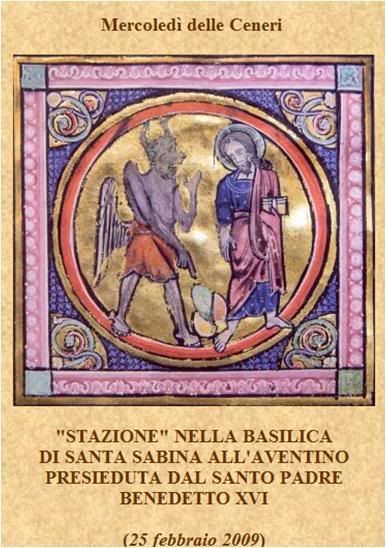 Ash Wednesday
Ash Wednesday
16:30 Basilica of St Anselm
Statio and Penitential Procession
17:00, Basilica of St Sabina, at 17.00
Holy Mass, Blessing and Imposition of the Ashes
POPE BENEDICT XVI MARKS
START OF LENT 2009
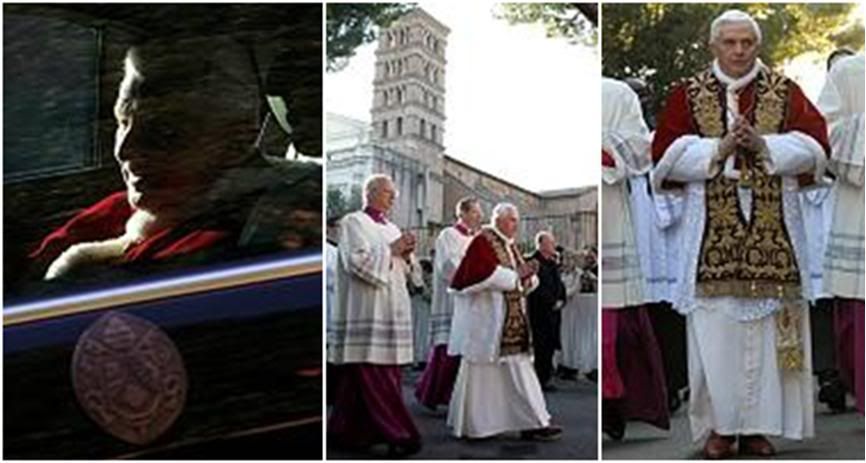
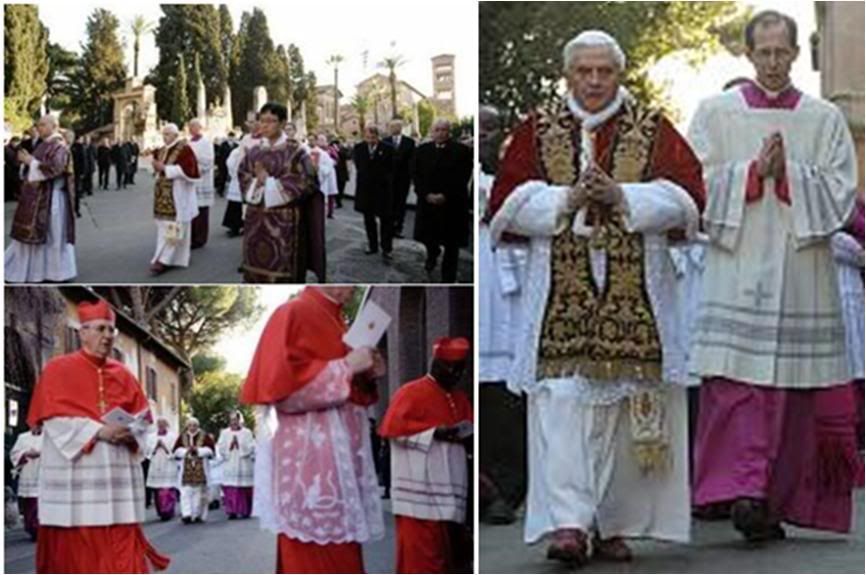
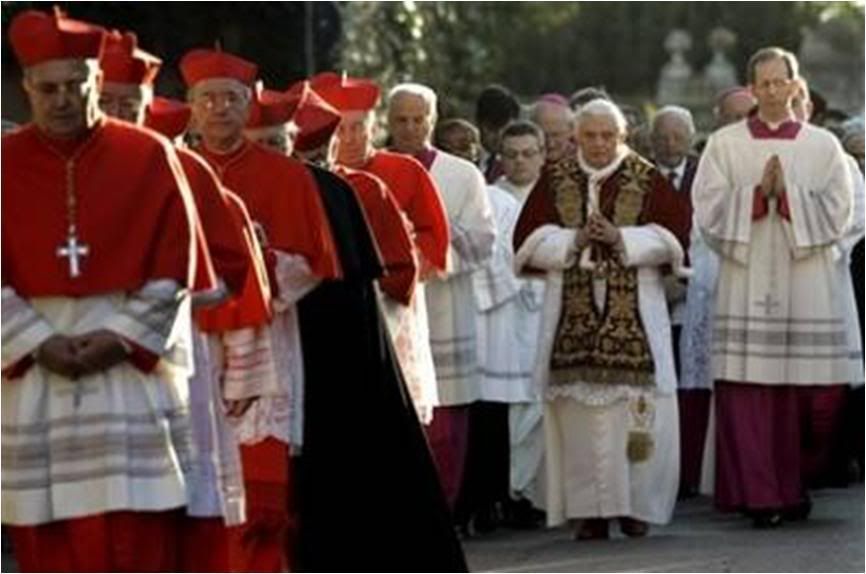
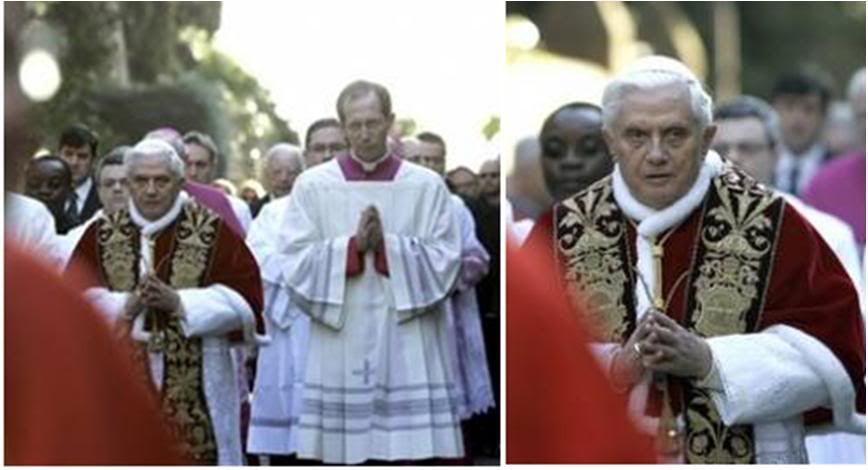
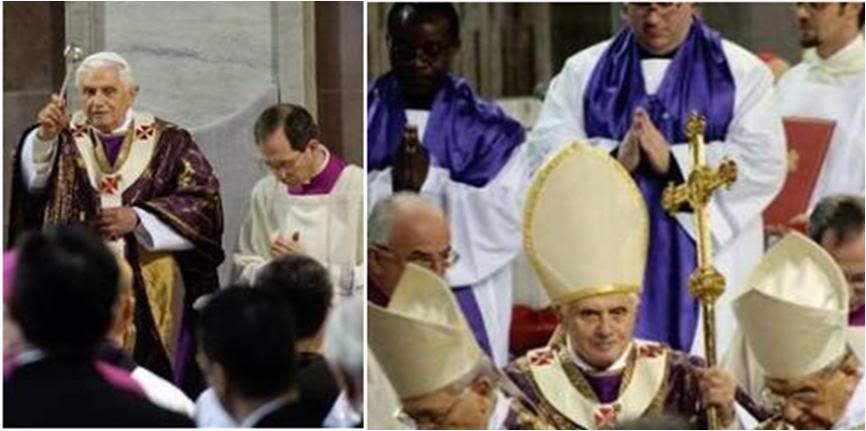
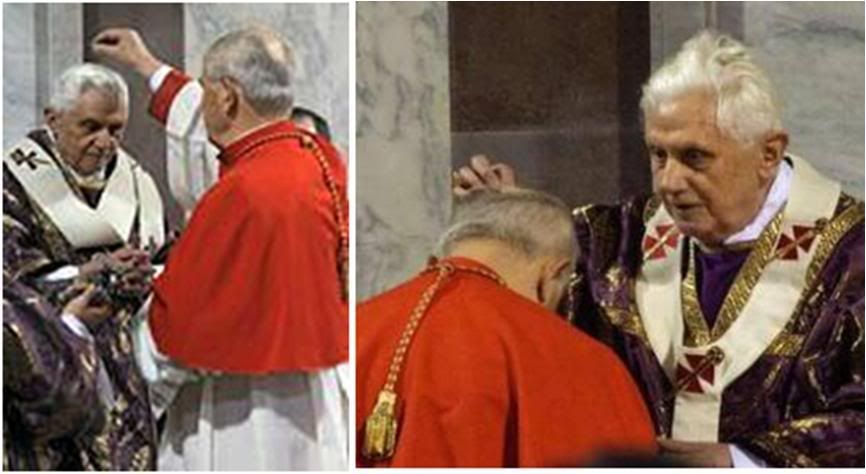
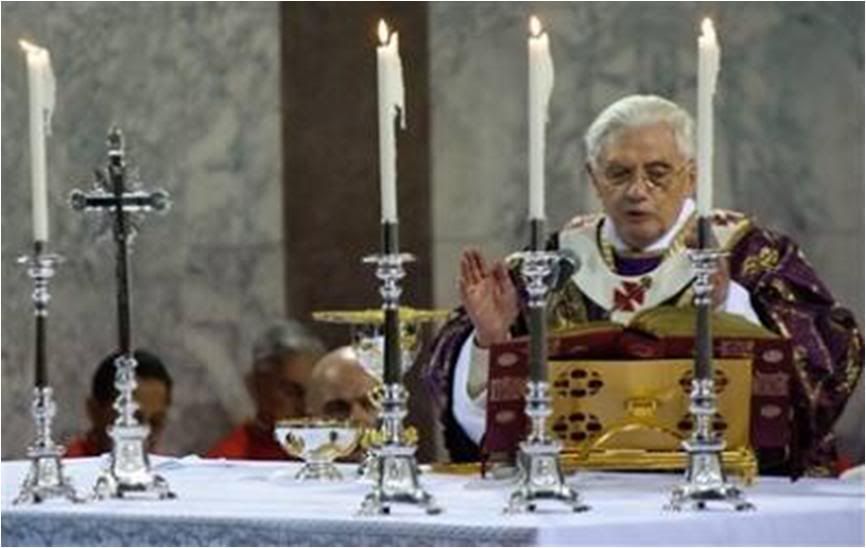 The Holy Father's homily:
The Holy Father's homily:
'Lent is a time of listening to the Word,
of austere living, conversion and charity'

Vatican City, Feb. 25 (AsiaNews) - Following the example of St. Paul, Lent should be marked by a more frequent listening to the word of God, "by more intense prayer, by an austere and penitential style of life, it should be an encouragement to conversion and sincere love for our brothers, especially those who are most poor and in need."
In the Pauline Year, the life of the Apostle of the Gentiles was offered by Benedict XVI as a model of how the Christian should live Lent, in today's celebration of Ash Wednesday at the ancient Roman basilica of Santa Sabina.
The ceremony was preceded, according to tradition, by a moment of prayer at the nearby church of Sant’Anselmo all’Aventino. From there the Pope, together with cardinals, bishops, priests and faithful, went in penitential procession to Santa Sabina.
During the Mass, Benedict XVI imposed the blessed ashes on some of those present, after Cardinal Jozef Tomko, titular archbishop of Santa Sabina, placed ashes on his head, under his papal zucchetto.
In the homily, the pope focused especially on a phrase from the second Letter to the Corinthians: "We implore you on behalf of Christ, be reconciled to God." (5:20).
"Paul," he commented, "experienced in an extraordinary manner the power of God's grace, the grace of the Paschal mystery that is the vital force of Lent itself. He presents himself to us as an 'ambassador' of the Lord. Who better than him, then, to help us travel in a fruitful way this path of interior conversion?"
"St. Paul," he continued, "recognizes that everything in him is the work of divine grace, but he does not forget that one must cooperate freely with the gift of new life received in Baptism."
"In the text of chapter 6 of the Letter to the Romans, which will be proclaimed during the Easter vigil, he writes, 'Therefore, sin must not reign over your mortal bodies so that you obey their desires. And do not present the parts of your bodies to sin as weapons for wickedness, but present yourselves to God as raised from the dead to life and the parts of your bodies to God as weapons for righteousness' (6:12-13).
"We find contained in these words the program for Lent according to its intrinsic baptismal perspective. On the one hand, it affirms Christ's victory over sin, which took place once and for all with his death and resurrection; on the other, we are urged not to give our members up to sin, meaning not to concede, so to speak, room for sin to make a comeback.
"But how can we bring to fulfillment our baptismal vocation, how can we be victorious in this struggle between flesh and spirit, between good and evil, a struggle that marks our existence?
"Today, the Lord points out three useful means for us: prayer, almsgiving, and fasting. We also find useful guidelines in the experience and writings of St. Paul. About prayer, he urges 'perseverance' and 'being watchful in it with thanksgiving' (Rm. 12:12; Col. 4:2), to 'pray without ceasing' (1 Thes. 5:17).
"As for almsgiving, the pages dedicated to the collection on behalf of poor brethren (cf. 2 Cor. 8-9) are certainly important, but it must be emphasized that for him, charity is the summit of the life of the believer, the 'bond of perfection': 'And over all these put on love, that is, the bond of perfection' (Col. 3:14).
"He does not speak of fasting specifically, but he often urges sobriety, as a characteristic of those who are called to live in watchful expectation of the Lord (cf. 1 Thes. 5:6-8; Titus 2:12).
"In order to live this 'new' life in God, it is indispensable to nourish oneself with the Word of God."
In this as well, "the Apostle is in the first place a witness: his Letters are the eloquent proof of the fact that he lived by the Word of God: thought, action, prayer, theology, preaching, exhortation, in him all of this was the fruit of the word he had received ever since his youth in the Jewish faith, fully revealed to his eyes by his encounter with the dead and risen Christ, and preached for the rest of his life during his missionary 'race'."
Thanks to Caterina for the ff videocap montages:
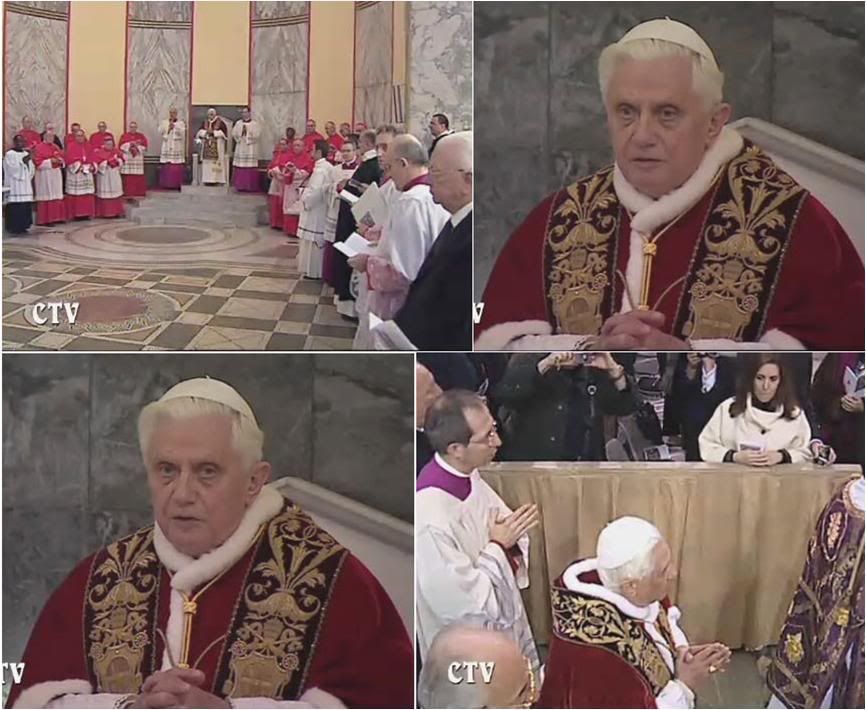
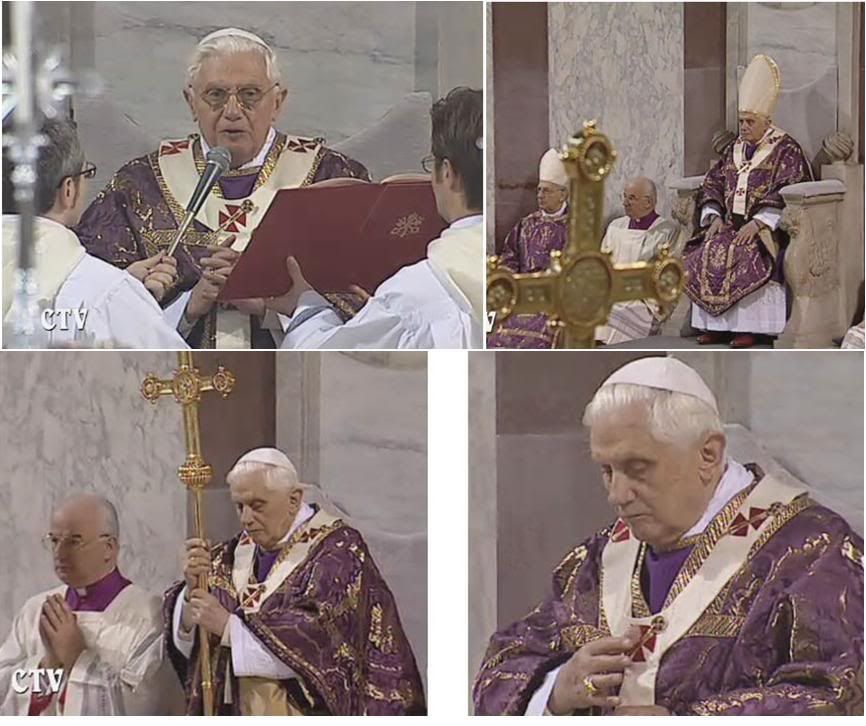
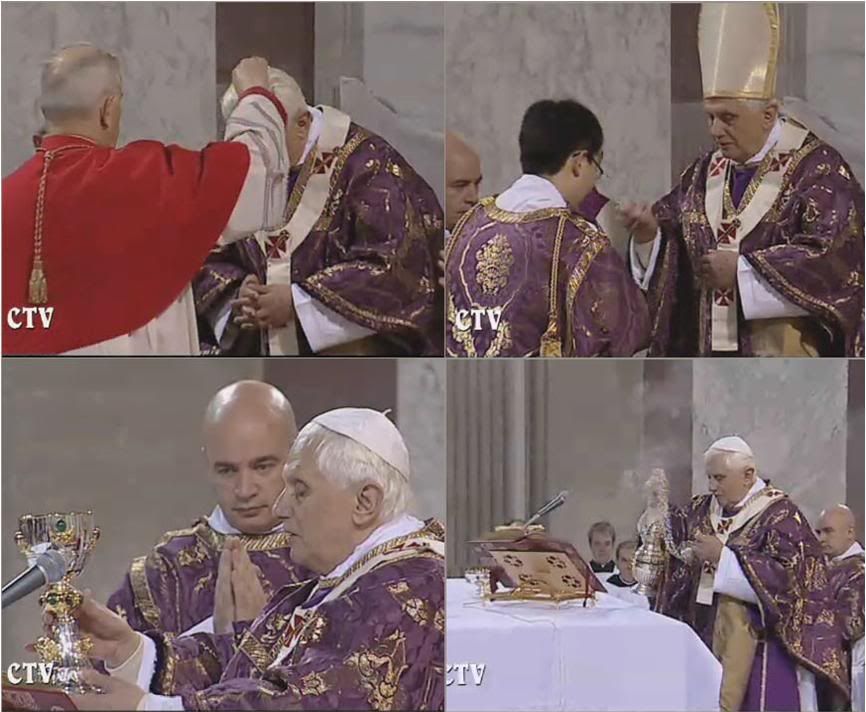
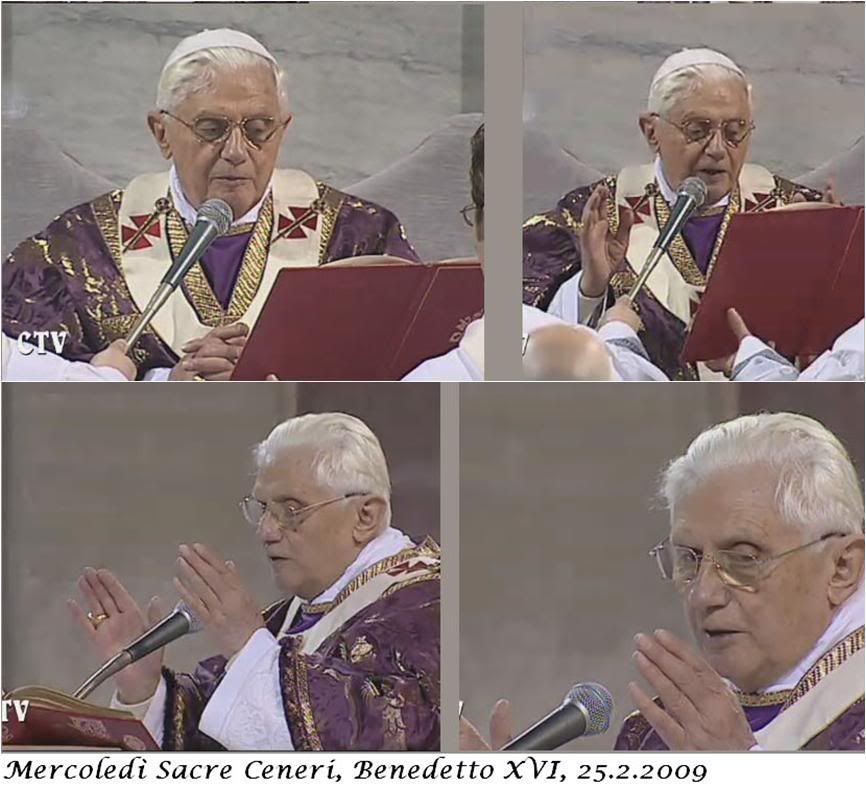
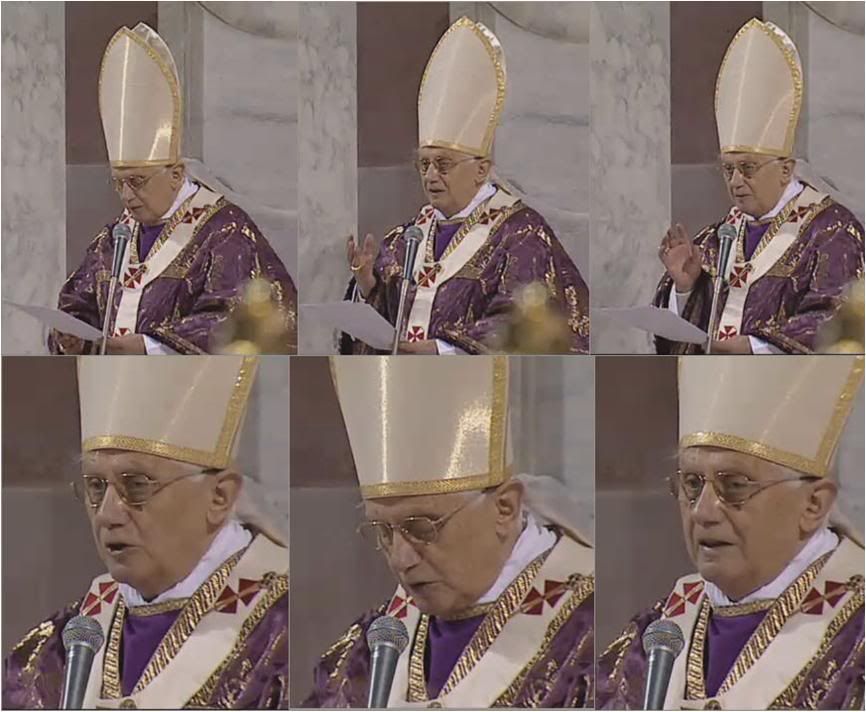
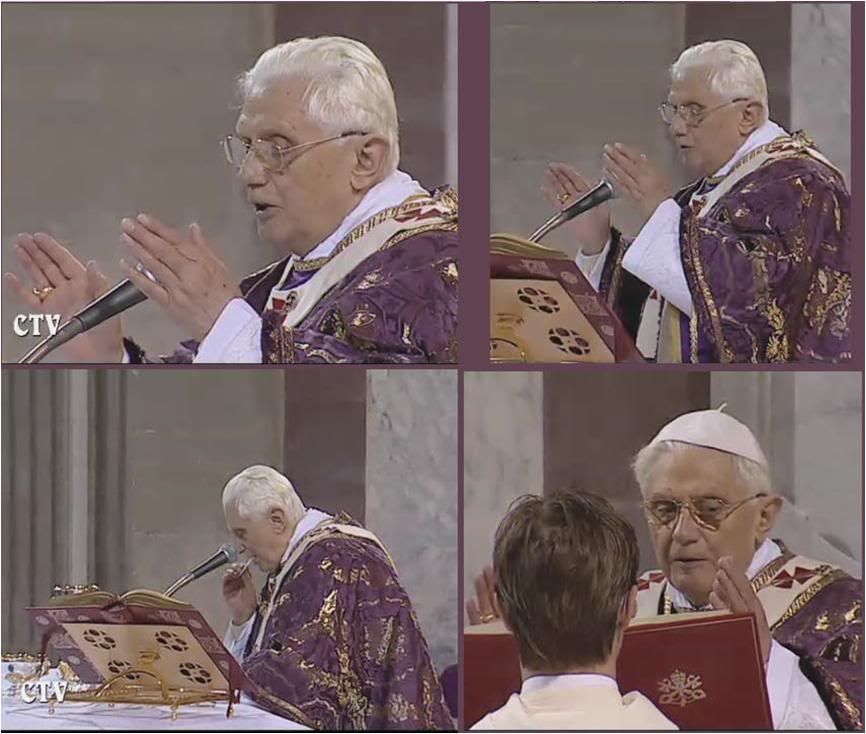
[Modificato da TERESA BENEDETTA 26/02/2009 23:30] |
 26/02/2009 01:37 26/02/2009 01:37 |
|
| | | OFFLINE | | Post: 16.718 | Registrato il: 28/08/2005
| Utente Gold | |
|
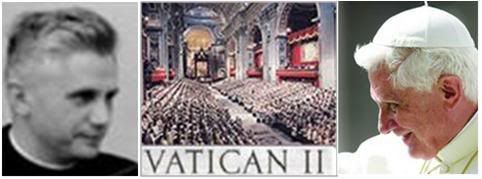 Once again, I take belated note of a significantn article in the wake of the FSSPX excom recall. This is not the fiorst time Fr. Komonchak has written positively of Benedict XVI's view of Vatican II.
Once again, I take belated note of a significantn article in the wake of the FSSPX excom recall. This is not the fiorst time Fr. Komonchak has written positively of Benedict XVI's view of Vatican II.
I do not remember what he wrote shortly after the December 22, 2005, address that touched on Vatican II, but he wrote an essay praising the Pope's views on Vatican II when the Holy Father made a brief reference to it during his Q&A with the clergy of the Cadore in 2007. I believe Sandro Magister reacted to Komionchak's article then by saying that the Bologna school was now seeking to co-opt the Pope to their view of Vatican II.....
Also, I believe the correct translation of the Pope's phrase is 'renewal in continuity' , not 'novelty in continuity'. 'Novelty' sounds too cavalier and gimmicky, whereas 'renewal' is the conventional term used in the spiritual sense.
Novelty in continuity:
Pope Benedict's interpretation of Vatican II
by Joseph A. Komonchak

FEBRUARY 2, 2009
It is now 50 years since Pope John XXIII surprised the world by announcing his intention to convoke an ecumenical council. Those of us old enough to remember it will recall the excitement the announcement generated among Catholics and in the larger world.
That an ecumenical council would take place was extraordinary; as Catholics count, there have been only 20 of them. Pope John gradually made his intentions for the council clear: the spiritual renewal of the Church, pastoral updating (aggiornamento) and the promotion of an eventual reunion of Christians.
For any of these goals to be achieved would require change in the church: spiritual renewal would demand repentance; updating would mean abandoning attitudes, habits and institutions no longer relevant and introducing ones more appropriate to the last third of the 20th century; and promoting Christian unity would mean working to overcome alienations with centuries of inertial force behind them. Something new and different appeared on the horizon. Pope John composed a prayer that the council might be “a new Pentecost!”
From the day it was announced (Jan. 25, 1959) to the day it ended (Dec. 8, 1965), the Second Vatican Council proved to be a particularly dramatic event, as a number of us can attest from personal experience and observation.
Sixteen documents represent what that encounter of some 2,500 bishops meeting under two Popes, John XXIII and Paul VI, wished to say to the Church and to the world. Those texts did not drop down from heaven, but resulted from a process of conversation, confrontation, compromise and conciliation.
Knowledge of this legislative history is necessary in order fully to understand and appreciate what the council wished to say — and chose not to say — in its final texts. In other words, history and hermeneutics (interpretation) go together. How they go together, however, is a key question.
Discontinuity or Reform?
On Dec. 22, 2005, the year in which he was elected, Pope Benedict XVI, on the occasion of the traditional year-end talk to the Roman Curia, included in his review of the previous months’ events the celebration of the 40th anniversary of the close of Vatican II. The Pope set out his thoughts on a correct interpretation of the council.
Before Pope Benedict’s speech, a few Italian prelates had expressed reservations about the five-volume History of Vatican II, of which Giuseppe Alberigo was the general editor and whose English edition I edited.
They promoted as a counterweight to it a collection of very critical reviews entitled Il Concilio Ecumenico Vaticano II: Contrapunto per la Sua Storia.
When it became known that Pope Benedict was going to address the interpretation of Vatican II, these critics anticipated that he would repudiate the view of the council thought to have guided the editors and authors of those five volumes. This is also how they interpreted the Pope’s speech.
There are, however, reasons for questioning their interpretation of Pope Benedict’s remarks. There are even reasons to think that these critics have greatly oversimplified his position and the underlying issue in the interpretation of the council, which Pope John Paul II called on various occasions “an event of the utmost importance in the almost two thousand- year history of the church,” a “providential event,” “the beginning of a new era in the life of the church.”
Pope Benedict began by contrasting two ways of interpreting the council. (I take it that he did this for rhetorical reasons; there are, of course, more than two contesting interpretations of Vatican II.)
The first he called the “hermeneutics of discontinuity.” In two short paragraphs he describes this approach as running the risk of positing a rupture between the preconciliar and the postconciliar church, thus ignoring the fact that the Church is a single historical subject.
This hermeneutic disparages the texts of the council as the result of unfortunate compromises and favors instead the elements of novelty in the documents. It may see the council along the lines of a constitutional convention that can do away with an old constitution and construct a new one, when, by contrast, the Church has received an unalterable constitution from Christ himself. That is the entirety of the Pope’s treatment of the “hermeneutics of discontinuity.”
One might have expected Pope Benedict to call the position he favors the “hermeneutics of continuity,” and careless commentators have used that term to describe his view. Instead, he calls it the “hermeneutics of reform.”
He devotes the greater part of his talk (85 percent by word-count) to explaining what he means by the phrase. And the greater part of this explanation sets out why at the time of the council there was need for a certain measure of discontinuity. After all, if there is no discontinuity, one can hardly speak of reform.
Keys to Interpretation
To illustrate his interpretative matrix Pope Benedict appeals to the two Popes of the council. From John XXIII’s speech opening the council, Benedict quotes the passage that, on the one hand, gives as one purpose of the council to transmit doctrine purely and integrally and, on the other, requires that doctrine be studied and presented in a way that meets the needs of the day.
Distinguishing between the substance and the expression of the faith, Pope Benedict affirmed, required both fidelity and dynamism. He then alluded to a passage in Paul VI’s closing speech that could provide some basis for proposing a hermeneutic of discontinuity, since it spoke of the alienation between church and world that had marked recent centuries.
It is this consideration that guides the rest of Pope Benedict’s talk to the Curia; somewhat surprisingly in a former professor of dogmatic theology, specific doctrinal debates do not concern him in this talk. [Consider the occasion! A traditional year-end discourse, usually a platform for well-meaning platitudes, in which, of course, one can touch on and reaffirm essentials but is hardly the time and place for making theological fien points!]
A very rapid survey illustrates the estrangement of the church and the modern era — from the Galileo case through the Enlightenment, from the French Revolution and rise of radical liberalism to the claims of the natural sciences to be able to do without the God-hypothesis.
Pope Benedict describes the Church’s reaction to this under Pius IX as one of “bitter and radical condemnations” met with equally drastic rejection by representatives of the modern era. There seemed no possibility of “positive and fruitful understanding.”
Since those days, however, things have changed. In a comment that John Courtney Murray, S.J., would have appreciated, the Pope says that the American political experiment demonstrated a different model than the one that emerged from the French Revolution.
The natural sciences were becoming more modest in their pretensions. After the Second World War, “Catholic statesmen demonstrated that a modern secular state could exist that was not neutral regarding values but draws its life from the great ethical sources opened by Christianity,” and Catholic social doctrine offered an alternative to radical liberal and Marxist theories.
On the eve of the council, then, three “circles of questions” had formed, all of which required new thinking and definition: the relationships between faith and modern science, between the church and the modern state, and between Christianity and other religions, Judaism in particular.
In each area, Pope Benedict said, “some kind of discontinuity might emerge and in fact did emerge,” a discontinuity that did not require the abandonment of traditional principles.
The Pope also describes the interpretative key he thinks should be applied to Vatican II: “It is precisely in this combination of continuity and discontinuity at different levels that the very nature of true reform consists.”
In explanation of this “novelty in continuity” he says that the church’s response on contingent matters must itself be contingent, even when based upon enduring principles. The principles can remain even when changes are made in the way in which they are applied.
Pope Benedict’s chief example was the council’s “Declaration on Religious Freedom,” which “at once recognized and made its own an essential principle of the modern state and recovered the deepest patrimony of the Church,” in full harmony with Jesus’s teaching and the church of martyrs of all ages.
If these new definitions of the relationship between the faith and “certain basic elements of modern thought” required the council to rethink and even correct earlier historical decisions, it did so to preserve and deepen the Church’s inmost nature and identity.
What the Pope calls “this fundamental ‘yes’ to the modern era” did not mean the end of all tensions, nor did it eliminate all dangers, and there are important respects in which the church must remain “a sign that will be contradicted” (Lk 2: 34).
What the council wished to do was to “set aside oppositions that derived from error or had become superfluous in order to present to our world the demands of the Gospel in its full greatness and purity.”
This was the council’s way of dealing with a difficulty in the relationship between faith and reason, stated biblically in the requirement that Christians be ready to give an answer (apo-logia) to anyone who asked them for the logos, the reason for their hope (1 Pet 3:15).
This led the church into a conversation with Greek culture. And in the Middle Ages, when it appeared that faith and reason were in danger of becoming irreconcilably contradictory, it brought St. Thomas Aquinas to mediate “the new encounter between faith and Aristotelian philosophy and so put faith into a positive relationship with the form of rational argument that prevailed at the time.”
It is telling that from the ensuing centuries Pope Benedict offers no examples of a similarly positive and successful achievement in what he calls “the wearying dispute between modern reason and the Christian faith.”
In the end, the clear disjunction between the two rival hermeneutical orientations with which the Pope began his remarks has become rather blurred in the course of his argument. The reform Benedict sees as the heart of the council’s achievement is itself a matter of novelty in continuity, of fidelity and dynamism. It involves important elements of discontinuity. [ DIM]8pt[=DIM][Ooooohhhhh, typically casuistic and Jesuitic argumentation! Why is it 'blurring' when Benedict picks out nuances for the sake of clarity, but permissible when it is the other side that splits hairs to make a shaky point?]
It is, of course, possible to contrast two approaches by saying of one: “You stress only continuity!” and of the other: “You stress only discontinuity!” But these positions are abstractions, and it would be difficult to find anyone who maintains either position.
Perhaps the Pope’s counterpoised hermeneutics represents what sociologists call “ideal types,” possibly useful tools for setting out the important questions, but not to be taken as literal descriptions of positions actually held by anyone. [Perhaps? As a lifelong academic and experienced lecturer, the Holy Father has become very skilled in the use of rhetorical devices to expose his views. Why would he not use it in this case?]
A hermeneutics of discontinuity need not see rupture everywhere; and a hermeneutics of reform, it turns out, acknowledges some important discontinuities. [And which side has it been that has adamantly fought for its ideologically one-sided view of Vatican-II but Fr.Komonchak's fellwo travelrs of the Bologna school>]
Persuading the Traditionalists
It has puzzled some observers that in order to illustrate his hermeneutics of reform, the Pope used the council’s new approach to the modern age and illustrated it by the treatment of religious freedom.
I think it is an indication that the Pope was not addressing himself primarily, and certainly not exclusively, to the editors and authors of the History of Vatican II.
When Giuseppe Alberigo wrote of the council as representing “una svolta epochale” (an epochal turning-point) he was referring in particular to the kinds of new relationships with the world that, Pope Benedict argues, the council needed to forge.
I think it is more plausible that the Pope sought to persuade a different group of people - traditionalists whose rejection of the council derives in no small part from their belief that its teachings on church and state and on religious freedom represent a revolutionary discontinuity in official Church doctrine.
[It doesn't take any deduction. The Pope made it explicitly clear that he was addressing extremists on both sides of the ideological spectrum.]
Archbishop Marcel Lefebvre, for example, had severely criticized the statement of then-Cardinal Ratzinger that Gaudium et Spes, Dignitatis Humanae and Nostra Aetate represented “a revision of the Syllabus, a kind of counter-syllabus...an attempt at an official reconciliation with the new age inaugurated in 1789.”
These texts, Ratzinger said, rightly left behind the one-sided and obsolete stances adopted under Pius IX and Pius X; it was time for the Church to “relinquish many of the things that have hitherto spelled security for her and that she has taken for granted. She must demolish long-standing bastions and trust solely to the shield of faith.”
Archbishop Lefebvre regarded these comments as “liberal banalities,” indifferent to or even scorning the support the Church received from the Catholic confessional state and its institutions. Union of church and state, Lefebvre argued, “is a principle of Catholic doctrine as immutable as the doctrine itself.”
Lefebvre’s successor, Bernard Fellay, invoked these paragraphs of Ratzinger in a letter in 2002 as an illustration of the points of serious disagreement that remain between Rome and Ecône. His group could never accept “any heterogeneous development of doctrine,” like what the council taught about religious freedom.
Pope Benedict’s talk on the interpretation of Vatican II could be read, then, as an effort at persuading traditionalists that a distinction is legitimately made between the level of doctrine or principle and the level of concrete application and response to situations.
His talk could be seen as on a par with others of his actions directed toward traditionalists, such as his clarification that the Catholic Church at the council did not surrender the claim to be the one true Church and his permission to make use of the unreformed liturgy.
So far, it would appear that Fellay’s group has not been persuaded. Alluding to the Pope’s remarks about interpreting Vatican II, Fellay said that the council needs more than a correct hermeneutic; its teaching must be revised and corrected.
On Continuity
The question of continuity can be put from at least three different standpoints. Doctrinally, there is clear continuity: Vatican II did not discard any dogma of the church and it did not promulgate any new dogma.
The council, however, did recover important doctrines that had been relatively neglected in recent centuries, like the collegiality of bishops, the priesthood of all the baptized, the theology of the local church and the importance of Scripture. Reasserting such things meant placing other doctrines in broader and richer contexts than before.
Finally, the council departed from the normal method and language of ecumenical councils like Trent and Vatican I, not least of all by following Pope John’s injunction that it offer a positive and widely accessible vision of the faith, and by abstaining from the anathemas that punctuated previous ecumenical councils.
Theologically, the council was the fruit of 20th-century movements for renewal: in biblical, patristic and medieval studies; in liturgical theology; in ecumenical conversation; in new, more positive encounters with modern philosophy; in rethinking the church-world relation; and in rethinking the role of lay people in the church.
Many of these movements had fallen under some degree of official suspicion or disapproval in the decades prior to the council, an attitude reflected in the official texts prepared for Vatican II.
There was real drama in the first session of the council (1962) when those texts were severely criticized for falling short of the theological and pastoral renewal already underway.
The rejection of the prepared texts itself brought discontinuity into the very unfolding of the council. Much of the drama of the rest of the council revealed the difficulty of determining what sorts of texts should take the place of those spurned, of recovering “the deepest patrimony of the church,” to use Pope Benedict’s words, and of finding a language in which to express it.
In all this there was considerable discontinuity.
From the standpoints of sociology and of history, one looks at the council against a broader backdrop, and one cannot limit oneself to the intentions of the popes and bishops or to the final texts.
One now studies the impact of the council as experienced, as observed and as implemented. It is hard from these standpoints not to stress the discontinuity, the experience of an event that broke with routine. This is the common language used by participants and by observers at the time.
The young Joseph Ratzinger’s own reflections after each session, published in English as Theological Highlights of Vatican II, are a good example. It is from this perspective that James Hitchcock calls Vatican II “the most important event within the church in the past four hundred years,” and the French historian/sociologist, émile Poulat, points out that the Catholic Church changed more in the 10 years after Vatican II than it did in the previous 100 years. [Yes, but what kind of changes prevailed? All the 'change' was on the side of the liberal causes that repudiate Catholic orthodoxy, such causes being pushed by its advocates - like the Bologna school that embodied the self-styled 'spirit of Vatican II' - as 'what Vatican II really meant".
Such positions createsd great chaos and confusion in the Church, and I don't think even Fr. Komonchak can argue that liberal militancy helped strengthen the faith in anyone. The faith the Spiritists profess is no longer the 2000-year-old faith, but something they invented for their convenience, to accommodate everything they disagree with about traditional Catholic teaching.
And because they will such changes, they insist on seeing them as changes within the Church, instead of the changes they wish to impose on the Church in order to subvert its orthodoxy - which in tehe etymological sense, simply means 'straight correct thinking'.]
Similar positions are held by people along the whole length of the ideological spectrum. Whether they regard what happened as good or as bad, they all agree that “something happened.”
It would be helpful if such distinctions of standpoint were kept in mind. They could help scholars to identify precisely where differences in the interpretation of Vatican II really lie, and to assess whether they are really in conflict with one another.
Pope Benedict’s own performance in this speech is one example of a serious effort at discernment and, were his nuanced effort imitated more widely, the debate about the council would be greatly elevated.
The Rev. Joseph A. Komonchak is the John C. and Gertrude P. Hubbard Professor of Religious Studies at The Catholic University of America, Washington, D.C.
Surprisingly, perennial Benedict critic Richard McBrien lifts Komonchak's arguments almost in toto in his Feb. 23 column entitled 'Pope Benedict on Vatican II'
ncronline.org/blogs/essays-theology/pope-benedict-vatican-ii
in the Feb. 23 issue of

He consludes therefrom:
However, some critics on the left and right have concluded, in the aftermath of Benedict's lifting of the excommunications, that the Pope is really siding with the Lefevbrites.
Such an assumption is open to serious challenge, and Joseph Komonchak's article in America helps us to see why this is so.
Fr. McBrien is the Crowley-O'Brien Professor of Theology at the University of Notre Dame.
[Modificato da TERESA BENEDETTA 26/02/2009 15:04] |
 26/02/2009 09:40 26/02/2009 09:40 |
|
| | | OFFLINE | | Post: 16.719 | Registrato il: 28/08/2005
| Utente Gold | |
|
 Although the Vatican does not consider the estrangement of the FSSPX from Rome a formal schism,
Although the Vatican does not consider the estrangement of the FSSPX from Rome a formal schism,
Fr. Baget Bozzo uses the term here loosely.
Behind the Pope's effort
to heal a schism
by GIANNI BAGET BOZZO
Translated from

Feb. 24, 2009
The incident which upset relations between the Holy See and the Jewish community was closed with the announcement that Pope venedidict will be travelling to Israel and Jordan, confirmed by Israeli Prime Minister Olmert.
But still some question whether a small group of traditionalists in Econe and the repair of the Lefebvrian schism are really worth risking such a high profile controversy as that with the Jews and one that even got the German Chancellor Angela Merkel caught up in it. [In a rash, imprudent, unjust - and belated - criticism of Pope Benedict, with Merkel apparently unaware that the Pope had already spoken out publicly about the issue!]
Nonetheless, the Pope has indicated he will carry on a dialog with the Lefebvrians, especially after the FSSPX superior-general. Mons Bernard Fellay, made clear his society firmly condemns negationism and anti-Semitism.
It certainly is not the size - or lack thereof - of the Lefebvrian community that is the problem. Rather, it is the thesis held out, by some in the Catholic world and many outside it, that the Second Vatican Council constituted a clean break between the pre-Conciliar Church and the post-Conciliar Church which has embraced modernity in a way diametrically opposite to the Church under Pius IX and Pius X.
In fact, during the Pontificate of Paul VI, during Vatican II and immediately afterwards, the entry of theologians into public activity and the debate on all the issues within the Catholic world had given the impression that the 'rupture' had most certainly not produced an enrichment of the language (or terms of the debate), but its outright alteration.
That is why the challenge mounted by Mons. Marcel Lefebvre after Vatican II went far beyond the issues of the schism that he had prepared and actually carried out.
Meanwhile, the action of all the Popes from Paul VI to Benedict XVI has been to show that the results of Vatican II are in continuity with the essence of Catholic tradition and are based on the positions of such tradition.
One may take anti-Jewish sentiment in the Church itself as an example, which in the 19th century anti-Semitic ideologies could point to in their support, even as Church theology remained firm in the belief in the value of the Jewish people and their moral and spiritual appartenance to the world of salvation till the end of time.
Joseph Ratzinger's charism, even as cardinal, is to unite continuity in tradition with the reforms of the Church decreed by Vatican II.
But did such a position, made clear by Benedict XVI from the start of his Pontificate, also require that he open up to a community that had created a schism and that had once defied papal authority? The Lefebvrian community appears to have toughened during their separation from Rome, to the point that their pre-Conciliar positions also became anti-Conciliar, and separation from Rome became the hallmark of their identity.
Pope Benedict obviously has not taken this hard line against them, and he has shown to them the same openness that the Council had decreed towards the Orthodox churches and the Protestant communities, seeking out convergences first instead of dwelling on differences.
The fact that the Lefebvrians have increasingly accepted papal authority and the Petrine primacy paved the way for a possible repair of the schism.
And this, in turn, would prove that the Catholic sentiment of continuity in tradition is far more powerful than attachment to certain dimensions that history is bound to show in a new light with the passage of time.
It has been quite dramatic for Catholic consciences to reconcile or accept the variances during the Conciliar and post-Conciliar years, as each Catholic had to deal with the identity of his faith.
Resolving the Lefebvrian schism would mean acknowledging the honest effort made by millions of faithful to seek beyond the language formulated by the progressive theologians the doctrinal and spiritual significance that they seek in their faith.
The Church aims to maintain the unity of the Catholic faith not only in space but also in time. In this respect, post-Conciliar activities have restored a balance to the Church.
But the conciliar and post-conciliar hope for a Catholic world at home in modernity has not been realized in the form desired by the theologians, because progress in science and technology has since provided man with new challenges very different from the social challenge from Communism that the world of Vatican II faced in the 1960s.
But the challenge of the times must unite the Church, allow it to close old wounds, in order to better face widespread secularism and an Islam that is overwhelming in its religious consciousness.
Likewise, the language of the Church to its faithful must also adapt beyond the language that served the Council and the period that followed it. And Pope Benedict provides the example for such a language.
[Modificato da TERESA BENEDETTA 26/02/2009 15:04] |
 26/02/2009 14:16 26/02/2009 14:16 |
|
| | | OFFLINE | | Post: 16.720 | Registrato il: 28/08/2005
| Utente Gold | |
|
 Here is an unusual editorial today in Il Giornale, a secular newspaper.
Why the Pope
Here is an unusual editorial today in Il Giornale, a secular newspaper.
Why the Pope
is under attack
By the Editors
Translsted from

February 26, 2009
Theologians, intellectuals and newspapers, unbridled - all have accused Benedict XVI of being a monk isolated in an ivory tower, of living 'castled' in the Vatican "as if he were in the Kremlin" [Marco Politi] and of transforming the Catholic church 'to a sect' [Hans Kueng].
Pope benedict XVU us in the line of fire, enemy fire for the most part, but also 'friendly fire'. Indeed, enemy fire also clearly has the intention and the hope of potentiating friendly fire.
The newspaper La Repubblica is at the center of this double play in Italy.
In Marco Politi's book on a Church of 'No's, he mostly talks to 'friendly fire' resource persons - he makes militant progressivist Catholics carry the fight against the Church and the Pope.
Yesterday, in an inerview for La Stampa, Hans Kueng attacked the Pope for the nth time, accusing him of 'betraying the spirit of the Second Vatican Council". [ COLORE]#1216FF[=COLORE][I would think he would say 'betray Vatican II' itself, not just its so-called spirit!]
It is not so much Pope Benedict who is the target but the role of the papacy. [I don't quite think so. Many of the most vicious detractors really have a deep-seated animus against the Pope himself, aggravated by their contempt for the institution of the papacy, and for the Church, too, for that matter!]
Paul VI had to face ecclesiastical dissent that was even more radical, and thought he had to formally draw up a new creed for the People of God, so much was he alarmed at how the foundations of the faith were being shaken.
Many times, especially with the encyclical Humanae Vitae, the dissent from bishops and theologians was strident. But Paul VI sought to fulfill his mission as Pope to keep the unity of the Church in time, keeping tradition intact as the foundation of the Church. [This glosses over Paul VI's greatest miscalculation when he sanctioned the unprecedented overnight reform of the Mass, in an inexplicable acceptance of Protestantizing changes which were emblematic of the secularization which has so undermined the Church.]
John Paul II circumvented dissenting bishops and theologians through his apostolic travels throughout the world, using the simple faithful as a barrier against the ascendancy of the deformed teachings coming from the dissenters.
As a Pole who had expressed the freedom of the Church in its truth in the face of Communism - and as the straw that finally broke the back of the Soviet empire - earned him universal honor, but not the consensus of those bishops and theologians who thought papal power should be reduced to nothing more than inter-episcopal coordination - and that theological debate should carry on without doctrinal or disciplinary considerations.
Pope Benedict is therefore in good company.
The occasion for the most recent barrage of 'friendly fire' was his revocation of the excommunications of the 4 FSSPX bishops, one of whom is a Holocaust denier.
The Pope's detractors have circulated an idea of a monkish theologian Pope enclosed in his study and with his liturgies: a Pope intent on being spiritual, when the times demand that he should govern and look after his image in the world along the mediatic model set by John Paul II.
With Pope Benedict, the relationship between the Church and oher cultures and religions has become intense and doctrinal. He has acted profoundly on Catholic relations with Judaism and Islam.
He has correlated such external relations with the doctrinal identity of the Church instead of simply reducing them to diplomatic relations or relationships pro forma.
Benedict's Pontificate is dense with significances and has not limited external Church relations to Vatican diplomacy - he has sought to imprint these relations unequivocally with the identity of the Church as the mystical Body of Christ.
John Paul II's Pontificate derived its greatest strength from his communicative success which depended on the personal qualities of Karol Wojtyla, not to the figure of the Papacy itself.
And Benedict XVI has proven the measure of his commitment by seeking a conformity between the doctrine of the Church and its actual life - for instance, asking the Synod of Bishops to confront the line between modernism and anti-modernism, in terms of relating the historico-critical analysis of the Bible to its value as a document of Christian faith impregnated by both Revelation and Tradition.
The decades which divide the early part of the 21st century from the 1960s - the Vatican-II years - weigh like centuries.
Modernity ended with the collapse of communism. And in the postmodern world, the crisis of capitalism has brought on new problems added to historic ones. The Muslim challenge ranks alongside the secularist challenge in a common attempt to reduce the Church to an insignificant post-modern miniority. The West and communism were much more internal to Catholic culture than what we may now call post-capitalism.
Meanwhile, benedict XVI has given a spiritual and intellectual profile to the Catholic Church in our time, in which the religious question is reinforced by the very contradictions of the world in which she must function.
In the non-Catholic Christian world, the most vital communities today are the Orthodox Churches and the Pentecostal communities - all similarly marked by a deep belief in spiritual experience and the mystery of the Christian event.
On the other hand, the Chriitan churches which have delivered themselves over to modernity and post-modernity - like the Anglical Communion and the Lutheran and Calvinist churches, the churches of the Reformation - appear to have exhausted their religious life.
Benedict XVI as Pope has continued the work and mission of the Popes, placing firmly the identity of the Catholic Church in a historical praxis, uniting mystery and message, orthodoxy and communication.
And it is for this that he is the target of both enemy fire and friendly fire.
A companion piece to this editorial was written by the newspaper's Vatican correspondent Andrea Tornielli. Will post when translated.
[Modificato da TERESA BENEDETTA 26/02/2009 15:03] |
 26/02/2009 14:45 26/02/2009 14:45 |
|
| | | OFFLINE | | Post: 16.722 | Registrato il: 28/08/2005
| Utente Gold | |
|

February 26
St. Porphyry of Gaza, Bishop (347-420)
OR today.
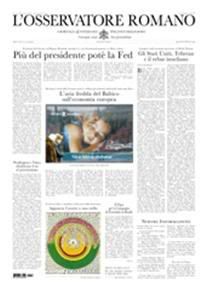 The newspaper goes to press at mid-afternoon for the following day's issue, so it does not have anything about the Pope's
The newspaper goes to press at mid-afternoon for the following day's issue, so it does not have anything about the Pope's
late-afternoon Ash Wednesday event yesterday. The only papal story on Page 1 is the Pope's letter to the Church in Brazil
for its annual 'Campaign for Brotherhood' for the benefit of the Amazon region, its resources and peoples. Financial
stories continue to dominate: In the US, the Federal Reserve chairman's statements against bank nationalization do more
to reassure the markets than any of President Obama's statements lately; Washington and Tokyo reaffirm commitment
against protectionism; and a Lithuanian crisis worsens threatened collapse of financial institutions employing the euro
as currency.
THE POPE'S DAY
The Holy Father today held his annual encounter with the clergy of Rome, in his capacity as Bishop of the Diocese.
As in the past years, it was structured as a Q&A session. No transcriot available yet.
[Modificato da TERESA BENEDETTA 26/02/2009 14:58] |
 26/02/2009 17:37 26/02/2009 17:37 |
|
| | | OFFLINE | | Post: 16.724 | Registrato il: 28/08/2005
| Utente Gold | |
|
 A number of significant reactions - including an unlikely one from Cardinal Sodano, of all people - have been published in the past few days to Hans Kueng's interview with Le Monde published earlier this week. I'll have to translate it for the record, as distasteful as it is, and even if much of it is his rehashed hostility and envy for one Joseph Ratzinger.
A number of significant reactions - including an unlikely one from Cardinal Sodano, of all people - have been published in the past few days to Hans Kueng's interview with Le Monde published earlier this week. I'll have to translate it for the record, as distasteful as it is, and even if much of it is his rehashed hostility and envy for one Joseph Ratzinger.
But first let me post this commentary from the French Catholic journalist who wrote a book on Benedict XVI in 2005 shortly after he became Pope. I have translated previous articles by Mr. De Plunkett before on this Forum. Parentheticals that are not colored blue here are his parentheticals.
The anti-Catholic intellectual offensive:
Aftershocks of the Williamson case
Translated from

25.02.2009
In the 'Williamson case', one witnessed the presence of 'errors' [in the words of Cardinal Christoph Schoenborn of Vienna] - or was it sabotage - committed by Vatican officials.
That failing is now being exploited to use against Catholicism itself through a veritable intellectual offensive which continues as a sort of seismic aftershock.
We can't say this offense is unimportant because that would be to think that what people say does not matter - which, in this case, would be idiotic.
In Le Monde on February 22, in a five-column article, the German medievalist Kurt Flasch wrote that the Vatican bungling of the Williamson case was not a mere random happenstance, but rather one following the 'general line' at the Vatican: namely, to come to terms with traditionalism [the word used is the French term 'integrisme' with its connotations of 'fundamentalism', i.e., extremism] in the name of a desire for unity and coherence within the Church. A desire that would, of course, violate post-modern relativism....
Fr. Flasch would have us believe that the Church commits faults of governance because it is cut off from society, and that such a cutting off is in the very nature of Catholic faith. The moral of the story, according to him: The Church will always act badly as long as it believes its faith is true!
Such an article is a 'formal notice' requiring an answer [as in law]. It is a challenge hurled at Catholic intellectuals and historians. Will they dare to answer?
No one had answered as of three days later, on Feb. 25, when Le Monde launched a second attack. It devoted all of Page 3 - announced on Page 1 - to an interview with Hans Kueng, whom the media still consider to be a symbol of rebellious youth (he is 81) and of the 'progressive base of the Church" (who really 'left the Church' a long time ago).
The headline for the article: 'The Church is in danger of becoming a sect'. [Whatever that means! A sect, as in something practised only by a suspect few? Or a sect, as something looked down by the rest of society which finds its views risible if not contemptible?]
From such a celebrated intellectual like Kueng, the argumentation he followed was disappointing. [Not to mention old and tired - words he now says by rote like a wind-up doll!]
He says, in effect:
- That Benedict XVI has not expressed himself 'unequivocally' about the Holocaust (That's a shameless lie!);
- That this Pope was 'elected by conservatives" (Also materially false, unless one considers any cardinal who does not agree with Kueng 'conservative');
- That Vatican II was indeed a true and proper 'rupture' (in which Kueng speaks like the late Mons. Lefebvre, except from the other side of teh spectrum);
- That Benedict's error is to deny this rupture in favor of a hermeneutic of continuity [Kueng despite his age appears not to know the work of scholars in the 1990s whose work has established that such an interpretation is well-founded);
- That Benedict is wrong to want a religion professed by faithful who are convinced believers (And what is wrong with that? True believers of Protestantism flourish everywhere);
- That Benedict XVI was wrong "when he told Protestants that the Catholic Church is the one true Church" (if this is an allusion to Dominus Iesus, the words alleged by Kueng are not to be found in that document) [????] ;
- That "the Catholic Church is in danger of becoming a sect" (because it insists that its members adhere to the Apostles' Creed);
- That the theology of the Council of Nice (he means the Creed) should be 'corrected';
- That Benedict XVI 'reverted' to conservatism because of his 'shock at the protest movements of 1968" [completely wrong, as i showed in my 2005 book Benoît XVI et le plan de Dieu [Benedict XVI and God's design');
- That 'divorced persons' are not allowed communion in the Church {How can Kueng say something like that?) [The prohibition is for divorced Catholics who remarry]; and
- That a Third Vatican Council should be called to deal with current issues - like married priests and the contraceptive pill (Kueng continues to profess liberal causes from 30-40 years ago).
In this catalog of platitudes, one clearly sees the media line vis a vis Catholicism.
But such grossness is surprising from the great Kueng. [Surely, this is ironic!]
What has happened to him? Has he become, with age, a kind of Jacques Duquesne [French writer and journalist who has written several books with a Catholic theme and has edited a few of France's leading Catholic newspapers] who aims to please old ladies? But to pose this question is to answer it, alas.
The true background for the problem with Kueng is difficult to explain to the general public which does not care about theological questions: it hears all the talk but is not really interested in what Catholics really believe.
But that is precisely the heart of the matter: faith, or the absence of it. Hans Kueng no longer adheres to the Catholic faith. [ DIM]8pt[=DIM][But he professes to, every chance he gets.] That's his right.
In turn, in 1979, the Church revoked his permission to teach Catholic doctrine [in any Catholic institution] - because of many opinions he holds about Church doctrine that he sees wrongly and that he expresses badly ,in language that aims above all to make the media salivate.
And why did Le Monde seek out the old man? Perhaps because young theologians do not think today as the media would want them to? "Critical Christianity" (which had become less and less Christian) has virtually collapsed and risks disappearing. [One would not think so from the recent media firestorm!]
Soon Catholicism will no longer have anyone but true believers; that will be the case - if it is not already. Few in number but truly convinced and well educated, therefore, able to bear true witness to what the Christian faith really is. And Le Monde does not like the prospect!
[He must be referring to French Catholicism. Because I don't see the cafeteria Catholics - at least not in the US - making any move to formally leave the Church; I think because they believe somehow that they will prevail, and soon]
That explains the ardor with which it [Le Monde] has been trying to transform the FSSPX affair, by kicking the ball as far as it can. But to what end? To discredit the Nicene Creed in the media? What an absurd ambition!
I was away from a PC for several hours today, but in the meantime, ZENIT has filed a story in English based on Cardinal Sodano's statements to Vatican Radio yesterday reacting to Hans Kueng's latest pronouncements.
Cardinal Sodano decries Küng's criticisms,
defends the Pope's commitment to Church unity
VATICAN CITY, FEB. 26, 2009 (Zenit.org).- The dean of the College of Cardinals says that fraternal critiques are always possible in the Church, but that generic, bitter ones do not contribute anything.
Cardinal Angelo Sodano affirmed this Wednesday to Vatican Radio in response to an interview with the theologian Hans Küng published by the French and Italian press. [The interview was published in Le Monde on Tuesday, and apparently published yesterday by La Stampa in an Italian translation.]
Küng, who was suspended by the Holy See in 1979 [No, he was forbidden to teach Catholic theology in a Catholic institution] because of his teachings against the Catholic faith [some teachings which question Catholic doctrine] , particularly criticized Benedict XVI's January decision to lift the excommunication of four Society of St. Pius X bishops.
He also attacked Church teachings and discipline in issues such as celibacy for the clergy and artificial contraception. The theologian claimed that these teachings put the Church in a "minority" position.
But Cardinal Sodano had a different viewpoint to offer. He said that regarding the lifting of the excommunication of the Lefebvrites, the Pope "who has been placed by the Holy Spirit to govern the Holy Church of God, is working a lot for unity in this important hour of history."
The cardinal said he was "hurt" by reading the interview, and contended that the accusations were "unproven, generic affirmations."
The prelate declared: "Fraternal critique is always possible in the Church, since the times of St. Peter and St. Paul. A bitter critique, on the other hand, and more if it is so generic, does not contribute to the good of the Church."
"Personally," he added, "I am a witness of the determination of the Holy Father to make the Church a family, the family of the children of God."
And the cardinal reflected, "I don't understand how an Italian newspaper, well up to date on the work of the Pope, has wanted to offer so much publicity to this interview."
*********************************************************************
Stronger statements criticizing Kueng's views and in defense of Pope Benedict XVI were made today by Cardinal Severino Poletti, Archbishop of Turin, and the Bishops' Conference of Piedmont (the region of which Turin is the capital). The Piedmontese bishops are particularly unhappy because La Stampa which published the Italian translation of the Le Monde interview, is published in Turin. Will translate later.
Meanwhile, here's hate-full, hateful Hans:
'The Church is in danger
of becoming a sect', says Kung
Interview by
Nicolas Bourcier et Stéphanie Le Bars
Translated from

24.02.09
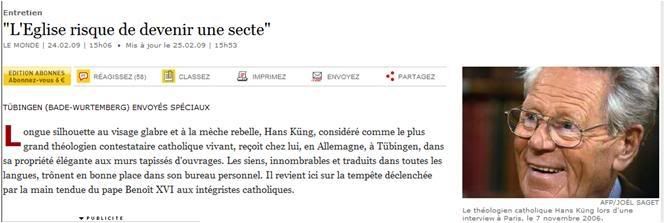
TÜBINGEN (BADEN-WURTEMBERG) - A tall man with a smooth face and rebellious hair, Hans Küng, considered as the leading dissident Catholic theologian alive, receives us at his home in Tübingen, in an elegant home whose walls are covered with books.
His own books, quite numerous and translated in all languages, are prominent in his own office.
He reviews with us the storm that was unleashed by Pope Benedict XVI's conciliatory hand towards a traditionaliet Catholic group.
How do you analyze Benedict XVI's decision to lift the excommunications for the 4 Lefebvrian bishops, one of whom, Richard Willliamson, denies the Holocaust?
I was not surprised. Since 1977, in an interview with an Italian magazine, Mons. Lefebvre stated that "some cardinals are aware of the situation" and that "the new cardinal, Ratzinger, has promised to intervene with the Pope to try and find a solution". This shows that the whole affair is neither a new problem nor a surprise.
Benedict XVI has always spoken a lot to these people. He has now lifted their excommunication because he believes the time is right. He thinks he can find a formula to re-integrate these schismatics who, while still retaining what they want to believe, could give the appearance that they agree with Vatican-II. He has been misled.
How do you explain that the Pope appears not to have gauged the outcry that his decision would provoke, even quite apart from the negationist statements of Richard Williamson?
Lifting the excommunications was neither a communications nor tactical fault, but it did constitute an error of governance in the Vatican. Even if the Pope had not known of Mons. williamson's negationist statements, and even if he is not anti-Semitic himself, everyone knows that the four bishops in question are anti-Semitic. [That's a rather sweeping statement that no one else, even among anti-FSSPX circles, has made - except for one statement recently published that was attributed to Bishop Tissier de Mallerait. The interviewers should have asked him what proof he has!]
In this affair, the fundamental problem is opposition to Vatican II, particularly the Lefebvrians' refusal to accept a new relationship with the Jews.
A German Pope should consider this as a central point and express himself without ambiguity about the Holocaust. [As if Joseph Ratzinger/Benedict XVI had ever been less than direct and clear when speaking about the Holocaust! When was he ever ambiguous about this?] But he didn't measure the risk. Unlike Chancellor Angela Merkel who reacted vigorously. [Yeah, right! More than one week late, in a classic 'ME TOO!', for the German electorate!]
Benedict XVI has always lived in an ecclesiastical milieu. He has travelled very little. [Really! For a cardinal whose primary task had little to do with diplomacy, I thought Cardinal Ratzinger had travelled around quite a bit. Though certainly not with the frequency of a highly sought dissident Catholic like Kueng with a lot of disposable time on his hands.]
He has been cooped up in the Vatican - which is a bit like the Kremlin in the recent past - where he is sheltered from criticism. [That's a real hoot! As though anyone in today's world can find shelter from criticism anywhere. And as if JR/B16 has not been the object of more unfair criticism than anyone in the Catholic world - since the 1980s at the very least!]
It is apparent that he has not been capable of realizing the impact of such a decision on the world. [So, he is not only 'cooped up' and 'sheltered', he is also that naive! Kueng's condescension is really offensive, and more so, because he knows he is lying through his teeth!]
Tarcisio Bertone, who could have been a counterweight [No offense to Cardinal Bertone, but Kueng seems to be over-estimating him disingenuously - the better to diminish Benedict XVI by implying that someone like Cardinal Bertone is the appropriate coutnerweight to him!] But he was his subordinate at CDF; he's a man of doctrine, absolutely submissive to Benedict XVI.
Here, we see a problem of structure. There is no democratic element whatsover in the system, no check and balance. [But the Church has never pretended to be a democracy - even if progressivists like Kueng insist it ought to be. A true faith can never be a democracy. it would be a contradiction in terms. There has to be a central authority to preserve and protect the deposit of faith - which is not and cannot be subject to public opinion polls or changing social mores.]
This Pope was elected by conservatives, and now, it is he who names conservatives [to high Church position, presumably].
To what degree can one say that this Pope is still loyal to the teachings of Vatican II? [Shame on these interviewers for appearing in any way to cast doubt on Benedict XIV's commitment to Vatican II!]
Oh, he is faithful to the Council, in his own way. He has always insited, like John Paul II, on its continuity with 'tradition'. For him, this tradition goes back to the hellenistic and medieval eras. [Excuse me! The 'Tradition' goes back to the time of Christ and the Apostles. Moreover, it is very likely that few Church hierarchs today have studied the early Fathers of the Church, East and West, as much as this Pope has done.]
But above all, he does not want to admit that Vatican II provoked a rupture - for instance, in the acknowledgment of religious freedom, which was fought by all the Popes before Vatican II. [The Pope has pointed out that like anti-Semitism, the Church has looked at these issues in a new light, and reformed its current attitudes accordingly. So, in these cases, what orthodox Catholics like Benedict XVI consider reform, the progressivists call a rupture. It's a semantic, and therefore, artificial issue. What matters is what the Catholic Church has been practising in the past 40 years about religious freedom and about anti-Semitism.]
Benedict XVI's deepest conviction is that one must accept the Council but it must be interpreted - perhaps not the way the Lefebvrians do, but in any case, in the light of tradition and in a restrictive way. For instance, he has always been critical of the liturgy of Vatican II. [He most certainly has not been restrictive about the post-Vatican IIliturgy. The liturgy of Vatican-II itself was always what is now the Extraordinary Form! It is so maddening when a world-class scholar like Kueng descends to factual mistakes like the most pedestrian journalist.
What JR/B16 has criticized are the unwarranted excesses that came to be tolerated and even encouraged in the name of the Novus Ordo. No one has ever accused Joseph Ratzinger of intervening in any way to discourage the use of the Novus Ordo, nor has he ever refused to follow it. In fact, he continues to be so respectful of what a predecessor of his did, after all, that he has yet to celebrate the
Extraordinary Form as Pope!]
Basically, Benedict XVI has an ambiguous attitude towards the texts of Vatican II, because he is not at ease with modernity and reform. [And people still listen to absurd ex-cathedra statements like these from K-EEEEEWWWWWW-NG?] Vatican-II represented the integration of the paradigm of reform and modernity into the Catholic Church. Mons Lefebvre never accepted it [That is false, since Lefebvre signed all the Vatican II texts as a Council Father. He began to take a distance after the traumatic overnight liturgical reforms imposed in 1970 and did not actually break away till 1988!] and neither did his friends in the Curia. [Lefebvre had friends in the Curia???? In the 1980s? By then, almost everyone in the Curia considered him a pariah.] In this, Benedict XVI had a certain sympathy for Mons. Lefebvre.
Moreover, I find it scandalous that for the 50th anniversary of the announcement by John XXIII that he was calling Vatican II, the Pope failed to praise his predecessor but chose the day to lift the excommunications from people who opposed his council.
[Mr. Kung - or is it still Fr. Kung - did you read the Pope's homily at Vespers on January 25, which closed the Week of Prayer for Christian Unity? At least, get your facts right!
The last third of the homily was devoted to John XXIII's historic announcement. The Holy Father spoke first about internal unity within the Catholic Church (without mentioning the FSSPX), then about the ancient alliance between Jews and Christians, and then about the eventual reunification of all the followers of Christ.
And the front-page editorial of L'Osservatore Romano that day, January 25, precisely drew attention to the appropriateness of the 50th anniversary of John XXIII's announcement on Vat-II for the announcement of Pope Benedict's great gesture towards healing a 20-year-old rupture in the Church!
What kind of a Church is Benedict XVI in the process of leaving as a legacy to his successors?
I think he favors the idea of 'small flocks'. It's somewhat the line of the 'integristes' who think that even if the Church should lose many of its members, it will be ultimately an elitist church, made up of 'true' Catholics.
It's an illusion to think one can go on like this - whtout priests, without vocations [Hey, guess what? The FSSPX and other traditonalist smeinaries are doing very well, thank you, and even some seminaries in the universal Church have been gaining somewhat. Not everyone is like Austria or Germany.]
What is happening now is clearly a movement of restoration. [Blind, tendentious and unfounded imputation. Perhaps a sign of desperation, even!] This is manifested in the liturgy [Really? the wider Church feels so threatened by the tiny 'stable groups' attending the traditional Mass?] but also by acts or gestures as, for instance, when he [Benedict XVI] tells Protestants that the Catholic Church is the only true Church of Christ. [And isn't it, Fr. Kueng? The Protestants came along 1500 years into Church history!]
Is the Catholic Church in danger?
It is in danger of becoming a sect. Many Catholics have stopped expecting anything of this Pope. And that is very sad. [Again, Mr. Scholar Kung, what are your numbers? Of the 1.2 billion Catholics today, what percentage do you think profess as you dissenters do?]
You have written "How could a theoretician who is so gifted, amiable and open like Joseph Ratzinger have changed to the point of becoming the Roman Grand Inquisitor". Well, then how? [Great. The interviewers adapt the viewpoint of their subject! Even if they did, they could at least play devil's advocate. Otherwise, they are nothing but cheap partisans lending themselves willingly to their interviewee's patently propagandistic intentions. Kung makes not the least attempt to be objective, blithely saying untruths and half truths and passing them off as objective fact.]
I think the shock of the protest movements of 1968 had revived his past. Ratzinger was conservative. During the Council, he opened up [Wow, again, sheer revisionism. He was open before the Council - otherwise, he would not have written what he did for Cardinal Frings before the Council opened] - evem if he was already somewhat skeptical. [Of course, he became skeptical when he saw the trend that the progressivists were taking! And he wasn't the only one. In the judgment of history, Henri de Lubac and Hans Urs von Balthasar already count as much more signal theologians of the Church than Kung can ever hope to be!] With 1968, he turned back to very conservative positions which he has kept to this day. [We've come to a pretty pass when a 'hostile witness' like Kueng is allowed to make up his own history of Joseph Ratzinger's thought - about which there can be no better testimony than his own copious writings! And did these two complacent journalists ever once seek to challenge any of Kung's spin - or at least his factual errors? No, it appears he effectively buried them in all the poisoned cotton-candy tall tales he spun for them!]
Can this Pope still correct this evolution? [Where is the interviewers' self-respect that they have compltely taken their interviewee's point of view?]
When he received me in 2005, it was a courageous act and I truly believed he would find the way to reform. even if slowly. [Wow! How patronizing!] But in four years, he has only proved the contrary.
Now, I ask myself if he is capable at all of doing anything courageous. Already, he must realize that the Cahtolic Church is goping through a profound crisis. [That's rich! Sir, he wrote a book about it in 1984, remember?, called the Ratzinger Report. He has not once said that things have changed for the better in all the points he criticized. What is he breaking his back for, tirelessly praching the essentials of the faith to whoever will listen?]
Further, he can easily make a gesture towards divorced Catholics and say that they can be allowed communion under certain conditions. [Look out again, Mr. Paint-Everything-Black-Itdoesn'tmatter! The Church has no problem with divorced Catholics - it's when they remarry that the problem arises, because you don't correct a previous mistake (divorce) by committing yet another (remarriage).]
He can correct the encyclical Humanae Vitae which condemned all forms of contraception in 1968 [No, only all forms of articifial contraception, Sir - because the natural form is desirable and recommended!] by saying that in some cases, the pill is possible. [It already is possible, when it is used to treat some medical conditions!]
He could correct his theology, whcih dates to the Council of Nicaea (in 325)!. [And what was wrong exactly with the Council of Nice, which gave us the Nicene Creed? Vatican II saw no need to change that creed, did it? One could do much worse today than think and teach the theology of the Church Fathers. and farther back to Jesus and St. Paul. If the truths of the Church are eternal, why should its theology change at all?]
And he could say tomorrow, "I am abolishing the rule of celibacy for priests". He is more ppowerful than the President of the United Sttaes. He does not have to answer to a Supreme Court. [No, he has to answer to a Higher Tribunal. He has to answer to the Lord for the ministry entrusted to him, and to the communion of saints who have lived by the Tradition Kung would so cavalierly let him annul overnight - the way the post Vatican-II liturgical reformers imposed their new liturgy on the entire Church overnight!]
And he can also call a new Council. [Yeah, right! Before the Church has even had a chance to consolidate what it must out of Vatican II, after it has first imposes some order to all the chaos that the progerssivists caused!
To call a new Council at this point is more than just folly because so unnecessary - it would also be an unconscionable assertion of ego on the part of the Pope who does not need any grandstanding. That Kung would even think it shows you where he's at. When he wrote his fantasy 'If Obama were Pope' last month, he was really projecting himself! ]
A Vatican III?
It could help. It would deal with the questions which Vatican II left unanswered such as priestly celibacy and birth control.
It is also necessary to provide for a new way of choosing bishops, in which the people would have their say.
The present crisis has inspired a resistance movement. Many faithful refuse to return to the old system. Even bishops have been obliged to critize the policies of the Vatican. The hierarchy cannot ignore them.
[Yeah, the tail should wag the dog. People should be allowed to decide what is convenient for them, not what is right according to the faith. How on earth could a Catholic theologian turn everything on its head? Since when have self-indulgence and convenience become the basic norms for any religion?]
Would your rehabilitation be part of such courageous acts?
In any case, it would be far easier than re-integrating the schismatics! But I don't think so, because Benedict XVI feels closer to the fundamentalists than to people like me who worked and accepted the Council. [And Joseph Ratzinger - did he not work for the Council too? Has he not worked all these decades to have it accepted as it should properly be accepted? Hardly a day goes by that he does not invoke Vatican II.
He is the Pope. He feels close to everyone - not only because it is part of his job description, but because he is a man who tries to live up to Christ in every way and every day.]
Cardinal Sodano decries Küng's criticism,
offers his own account of the 'real' Benedict XVI

VATICAN CITY, FEB. 26, 2009 (Zenit.org).- The dean of the College of Cardinals says that fraternal critiques are always possible in the Church, but that generic, bitter ones do not contribute anything.
Cardinal Angelo Sodano affirmed this Wednesday to Vatican Radio in response to an interview with the theologian Hans Küng published by the French and Italian press.
Küng, who was suspended by the Holy See in 1979 because of his teachings against the Catholic faith, particularly criticized Benedict XVI's January decision to remove the excommunication of four Society of St. Pius X bishops.
He also attacked Church teachings and discipline in issues such as celibacy for the clergy and artificial contraception. The theologian claimed that these teachings put the Church in a "minority" position.
But Cardinal Sodano had a different viewpoint to offer. He said that regarding the lifting of the excommunication of the Lefebvrites, the Pope "who has been placed by the Holy Spirit to govern the Holy Church of God, is working a lot for unity in this important hour of history."
The cardinal said he was "hurt" by reading the interview, and contended that the accusations were "unproven, generic affirmations."
The prelate declared: "Fraternal critique is always possible in the Church, since the times of St. Peter and St. Paul. A bitter critique, on the other hand, and more if it is so generic, does not contribute to the good of the Church."
"Personally," he added, "I am a witness of the determination of the Holy Father to make the Church a family, the family of the children of God."
And the cardinal reflected, "I don't understand how an Italian newspaper, well up to date on the work of the Pope, has wanted to offer so much publicity to this interview."
Frankly, I am surprised - but nonetheless pleased and grateful - that Cardinal Sondao volunteered this 'defense' of the Pope.
[Modificato da TERESA BENEDETTA 23/08/2009 00:02] |
 26/02/2009 17:42 26/02/2009 17:42 |
|
| | | OFFLINE | | Post: 16.725 | Registrato il: 28/08/2005
| Utente Gold | |
|
BISHOP WILLIAMSON APOLOGIZES
TO EVERYONE, INCLUDING THE JEWS
 The Pontifical Commission Eccleisa Dei released this statement today:
The Pontifical Commission Eccleisa Dei released this statement today:
DECLARATION
The Holy Father and my Superior, Bishop Bernard Fellay, have requested that I reconsider the remarks I made on Swedish television four months ago, because their consequences have been so heavy.
Observing these consequences I can truthfully say that I regret having made such remarks, and that if I had known beforehand the full harm and hurt to which they would give rise, especially to the Church, but also to survivors and relatives of victims of injustice under the Third Reich, I would not have made them.
On Swedish television I gave only the opinion (..."I believe"..."I believe"...) of a non-historian, an opinion formed 20 years ago on the basis of evidence then available and rarely expressed in public since.
However, the events of recent weeks and the advice of senior members of the Society of St. Pius X have persuaded me of my responsibility for much distress caused. To all souls that took honest scandal from what I said before God I apologise.
As the Holy Father has said, every act of unjust violence against one man hurts all mankind.
+Richard Williamson
London 26 February 2009.
I thank the Lord for leading the bishop to make this statement. He will certainly be faulted by many for not retracting his negationism outright , but at least, he has done the right thing with his apologies, while remaining 'intellectually honest' in not professing a retraction hypocritically out of sheer expediency. May the Holy Spirit guide him further!
I must remark that he has shown an obedience and submission in this matter so far to his superior and to the Pope, which I wish some Catholic prelates would show the Pope.
P.S. I find it intriguing that Williamson chose to release his statement through Ecclesia Dei, not through FSSPX, and certainly not to all the media in London who have been avidly in wait since he arrived in his home country yesterday from Argentina.
As soon as I saw the story online shortly before noon, I immediately checked thE UK newspapers for anything about it. NADA! From the time-stamps of the posts, Father Z had it on his blog an hour before I posted; Lella had the Ecclesia Dei release in English and Italian 30 minutes later, along with the ZENIT story - and the first mention in the Anglophone press did not come until 4 hours later, from Reuters, quoting ZENIT, as did the New York Times. And AP did not file its story until around 5:45 p.m., also using ZENIT as its source.
Anyway, here's the NYT story, for the record:
Bishop offers apology for Holocaust remarks
By RACHEL DONADIO

February 26, 2009
ROME — A bishop whose recent rehabilitation by Pope Benedict XVI provoked global outrage has apologized for remarks in which he denied the Holocaust, a Catholic news agency reported on Thursday.
The bishop, Richard Williamson, was one of four traditionalist bishops whose excommunications Pope Benedict revoked last month. In an interview broadcast on Swedish television several days before that, Bishop Williamson denied the existence of the Nazi gas chambers and the scope of the Holocaust.
In a statement published by the Zenit news agency on Thursday, Bishop Williamson said, “I can truthfully say that I regret having made such remarks, and that if I had known beforehand the full harm and hurt to which they would give rise, especially to the church, but also to survivors and relatives of victims of injustice under the Third Reich, I would not have made them.”
He added, “To all souls that took honest scandal from what I said, before God I apologize.”
His statement did not address the content of his televised remarks, in which he said that no more than 300,000 people died in the Holocaust and none in gas chambers. In recent weeks, he has said in interviews that he needs more time to study documentation about the Holocaust.
In his statement on Thursday, he said that the views he expressed on Swedish television were those of “a nonhistorian,” and that his perspective was formed “20 years ago on the basis of evidence then available, and rarely expressed in public since.”
The impact of a German pope pardoning a Holocaust denier prompted widespread criticism, engulfing the Vatican in an international political crisis. Many local churches were sent scrambling to reassure parishioners worried about the Vatican’s moral authority.
In an effort to control the damage in recent weeks, the p\Pope has repeatedly condemned Holocaust denial. This month, in a rare instance [Rare? It's done all the time for a number of reasons - because the Pope cannot be too specific about certain things, nor go into detail about what he says that is not pastoral] of the Vatican’s expanding on comments by the Pope himself, the church said that Bishop Williamson must distance himself from his statements on the Holocaust or he would not be allowed to serve as a bishop in the Roman Catholic Church. The Vatican also said that Benedict was not aware of Bishop Williamson’s remarks when he decided to revoke his excommunication.
Bishop Williamson said Thursday that he had been asked “to reconsider” his remarks by the Pope and Bishop Bernard Fellay, the superior general of the traditionalist Society of St. Pius X to which Bishop Williamson belongs, “because their consequences have been so heavy.”
Jesús Colina, the director of the Rome-based Zenit news agency, said he had received Bishop Williamson’s statement from the Vatican committee that oversees relations with the Society of St. Pius X [Ecclesia Dei] , and had confirmed its veracity with Cardinal Darío Castrillón Hoyos, who oversees the committee. [But ZENIT was dishonest in its story because it datelined it from LONDON, not the Vatican, and never once mentioned that the statement came through Ecclesia Dei! - giving the impression that it got the story 'directly'!]
Attempts to reach the cardinal were unsuccessful. The Vatican spokesman, the Rev. Federico Lombardi, said he had no comment on the report of Bishop Williamson’s statement.
Some outside observers were not convinced by Bishop Williamson’s statement. “He does everything except confront the central issue of this whole crisis,” said Rabbi Marvin Hier, the founder of the Simon Wiesenthal Center in Los Angeles. “Has he changed his mind about the Holocaust, and does he believe that the Holocaust is a historic fact?”
He said he did not think that Bishop Williamson should be accepted as a bishop in the Catholic Church until his apology included recognition of the Holocaust.
The Society of St. Pius X is an ultraconservative group founded in opposition to the liberalizing reforms of the Second Vatican Council.
The four rehabilitated bishops were ordained by their schismatic leader in 1988 without papal approval; they were then excommunicated by Pope John Paul II. Last month Pope Benedict revoked the excommunications to heal a schism in the church.
In later statements, the Vatican has said that the society must accept the teachings of Vatican II before it can be brought in full communion with the church. It remains to be seen how Bishop Williamson’s statement on Thursday will affect negotiations between the Vatican and the Society of St. Pius X.
This week, Bishop Williamson was expelled by Argentina, where he directed a seminary, and traveled to Britain.
On Thursday, the Pope John Paul II Cultural Center and the Anti-Defamation League announced that they were starting a renewed Catholic-Jewish dialogue in the United States.
[Modificato da TERESA BENEDETTA 27/02/2009 13:03] |
 27/02/2009 01:13 27/02/2009 01:13 |
|
| | | OFFLINE | Post: 3.614 | Registrato il: 23/11/2005
| Utente Master | |
|
And here is some of the predictable response to the apology.
Bishop apologizes for Holocaust remarks
February 26, 2009
JERUSALEM (JTA) -- Bishop Richard Williamson apologized for making comments minimizing the Holocaust, but he did not recant them.
"The Holy Father and my Superior, Bishop Bernard Fellay, have requested that I reconsider the remarks I made on Swedish television four months ago, because their consequences have been so heavy," Williamson said in a statement published Thursday by the Zenit Catholic News Agency.
Pope Benedict XVI sparked a furor last month when he reinstated Williamson and three other excommunicated bishops, all members of the traditionalist Society of St. Pius X, just days after Williamson told Swedish TV that he believed "that the historical evidence is hugely against 6 million Jews having been deliberately gassed in gas chambers as a deliberate policy of Adolf Hitler." He said no more than a few hundred Jews died in Europe during World War II.
This week, Williamson expressed regret for making the remarks.
"Observing these consequences I can truthfully say that I regret having made such remarks, and that if I had known beforehand the full harm and hurt to which they would give rise, especially to the Church, but also to survivors and relatives of victims of injustice under the Third Reich, I would not have made them," he said.
Williamson concluded, "To all souls that took honest scandal from what I said, before God I apologize. As the Holy Father has said, every act of injust violence against one man hurts all mankind."
The founding chairman of the International Network of Children of Jewish Holocaust Survivors, Menachem Rosensaft, called Williamson's apology unacceptable.
“Williamson’s disingenuous apology cannot close the book on this chapter,” Rosensaft told JTA. “Williamson in no way recanted his denial of the Holocaust. Instead, he merely expressed regret that his public expression of his noxious views called attention to Pope Benedict XVI’s ill-advised attempt to rehabilitate him."
|
 27/02/2009 01:17 27/02/2009 01:17 |
|
| | | OFFLINE | Post: 3.615 | Registrato il: 23/11/2005
| Utente Master | |
|
Vatican seen preferring Haifa over Nazareth
By Barak Ravid and Jack Khoury
Haaretz.com
Feb. 27, 2009
Vatican officials seem to be leaning toward Haifa over Nazareth as the site for Pope Benedict XVI's principal Mass during his planned visit to Israel this May, a senior government official involved in preparations for the visit said yesterday.
A delegation from the Vatican is currently here to meet with representatives of various government ministries and discuss plans for the papal visit, and Wadia Abu Nassar, who is coordinating media coverage of the visit, said the Vatican would probably provide details of the pope's itinerary within days. On Sunday, the cabinet is expected to approve an allocation of NIS 43 million to cover the cost of the preparations.
Haifa and Nazareth are both competing fiercely for the honor of hosting the Mass, which will give whoever wins it a moment in the international spotlight. Thousands of people are expected to attend the Mass, which will be televised live worldwide.
The Vatican delegation - consisting of chief of protocol Dr. Albert Gaspari and his aide, Dr. Paul Cordini, along with the Papal Nuncio, Archbishop Antonio Franco - met with municipal officials in Haifa and Nazareth, each of which presented plans and sketches of its proposed venue for the Mass. But according to the senior official, the Vatican representatives "looked at the site in Nazareth and made a sour face."
Nazareth proposed Precipice Mountain, in the southeastern part of the city. The city's strategic planning department presented detailed maps showing where the altar would be and how seating would be arranged, and emphasized that the view included the landmark Basilica of the Annunciation.
But the senior official said the open-air site, which is not yet ready, can only hold a few thousand people. Moreover, access would be difficult for the expected busloads of believers from throughout the country.
In contrast, Haifa offered the new Carmel Port, a 300-dunam (75-acre) concrete space that the city says can hold more than 100,000 people. It also has better infrastructure, the senior official said.
Haifa might also be preferable because the municipality has promised to make every effort to facilitate the papal visit, while in Nazareth, municipal representatives said the government alone should be responsible for the visit, he added.
Sources in Nazareth said they are concerned that government officials would try to tilt the scales away from Nazareth by citing security and other reasons, though Israel is supposed to remain neutral in the matter. Officials involved in the planning said there are also power plays among members of the clergy, with each faction pulling in a different direction.
Haifa Mayor Yona Yahav conceded that his seaside city has no special Christian significance, but argued that it is the most convenient place to host Benedict. Moreover, he said, given that brotherhood is something Benedict preaches about all over the world, Haifa could serve as a model, being a city that "has maintained peace between Jews and Arabs for more than 100 years."
Nazareth Mayor Ramez Jaraisy touted his city by saying that Jesus was "a son of Nazareth, not of Haifa," and argued that Nazareth was ready logistically "to the last detail." He added that he was in personal touch with Vatican representatives and that others were also pressing for Nazareth as the site of the Mass.
Even if Benedict does not celebrate Mass in Nazareth, he would presumably still visit the city and its sacred sites and meet with Christian leaders.
|
 27/02/2009 13:39 27/02/2009 13:39 |
|
| | | OFFLINE | | Post: 16.727 | Registrato il: 28/08/2005
| Utente Gold | |
|
 Pope explains delay
Pope explains delay
of 'social encyclical'
during annual meetihg
with the priests of Rome
By Cindy Wooden

VATICAN CITY, Feb. 26 (CNS) -- The global economic crisis has contributed to the delay in the publication of Pope Benedict XVI's new social encyclical, not for financial reasons, but because the crisis has demonstrated how important and how complicated the topic is.
If the encyclical "does not deal competently with the economic reality, it cannot be credible," Pope Benedict said Feb. 26 in response to a question from a priest of the Diocese of Rome.
During the Pope's annual question-and-answer session with more than 400 priests ministering in Rome, a pastor from a poor neighborhood asked how church members could do more to push for a real reform of the global economic system.
Pope Benedict said he did not want to give a simplistic answer to a complicated question about the reality of global finance and said that, in fact, the complexity of the current situation is what has delayed the publication of his social encyclical, tentatively titled Caritas in Veritate (Love in truth).
"As you know, for a long time we have been preparing an encyclical on these points, and on its long journey one can see how difficult it is to speak competently about it," the Pope said.
On the level of global economic systems, the Pope said almost every person in every country is feeling the consequences of "these fundamental errors that have been revealed in the failure of the large American banks; the error at the basis of it is human greed."
"We must denounce this (system) with courage, but also with concreteness because moralizing will not help if it is not supported by an understanding of reality, which also will help us understand what can be done concretely to change the situation," he said.
Pope Benedict said the crisis demonstrates that "original sin really exists. If it did not exist, we could appeal to reason, lucidly, with arguments that are accessible to all and incontestable and to the good will of everyone."
But the force of reason and good will are not strong enough to overcome the sins of greed and selfishness and the temptation to put one's own interests first, he said.
While the global financial system must be reformed, the Pope said, individuals also must accept the fact that they will have to make some sacrifices in order to help the poor and move the world toward justice.
"Justice cannot be created only with economic reforms, which are necessary, but it also requires the presence of just people," he said.
"As long as original sin exists, we will never have a radical and total correction" of unjust systems, "but we must do all that we can to achieve at least a provisional, sufficient correction that would permit humanity to live and would be an obstacle to selfishness," Pope Benedict said.
The economy was just one of the topics discussed when the pope met the priests, spending more than 90 minutes listening and responding to questions posed by eight of them.
Pope Benedict told the priests that it was important for him to know the life, experiences, challenges and joys facing the priests in his diocese.
"I want to learn, to draw closer to the daily reality from which someone in the Apostolic Palace risks being a bit too distant," the pope said, in a reference to his residence.
The Pope said the high-level contacts he has, especially with bishops from around the world, are very helpful for getting an overview of the life of the universal church, but he cannot know the hopes and sufferings of individual Catholics in the way a parish priest can.
The gathering included lighthearted moments when a priest read a poem he wrote in the Roman dialect and when the Pope teased some of the priests for asking long, complicated questions or basically answering their own questions.
[Modificato da TERESA BENEDETTA 01/03/2009 15:43] |
|
|
|
|